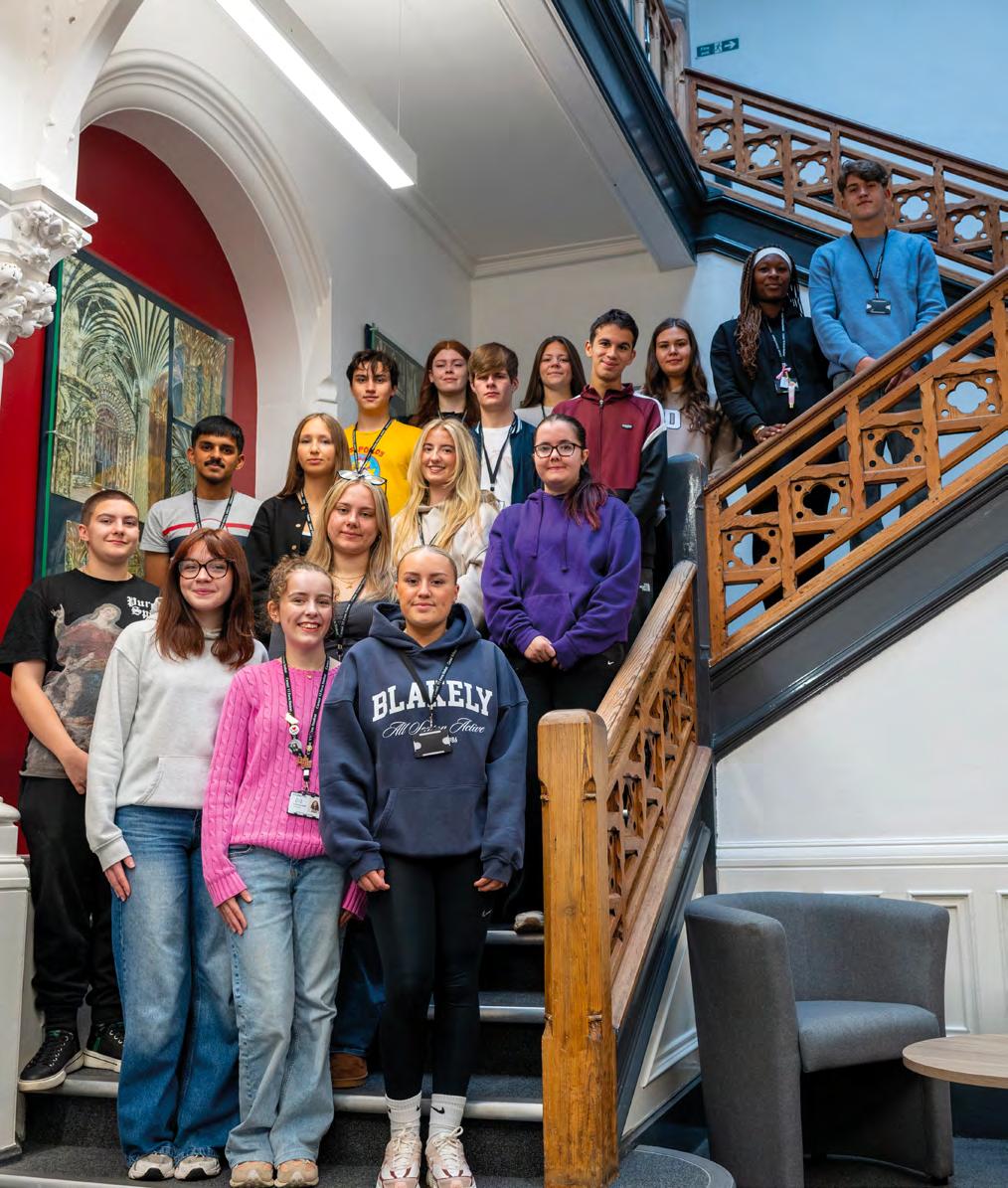

Prospectus
2025/26



2025/26
We are an 11-18 Catholic Academy with an outstanding record of academic achievement at both GCSE and A Level, which places the College as one of the top performing schools in the country.
Carmel Sixth Form provides outstanding academic and vocational courses for students from all over Darlington and surrounding areas. The Sixth form is renowned for high quality teaching, small classes, personal support and fantastic opportunities.
We are proud to provide an environment of joyous corridors and purposeful classrooms, with the expectation that students have a rewarding and fulfilling experience during their time with us.

MELANIE KANE Principal, Carmel College
So, you’re starting to think about your next steps after secondary school. Choosing where to go can feel overwhelming, but it doesn’t need to be. By choosing Carmel Sixth Form, you’ll be making a confident decision that sets you on a strong path towards higher education or successful employment.
At Carmel, we strike the right balance between the structure you’ve known in school and the independence you’ll need for the future. Post 16 study is demanding, but here, you’ll be supported every step of the way. Our academic and pastoral care is second to none, and we’re proud to offer an environment where students are both challenged and nurtured.
We’ll equip you with the practical and emotional tools to manage the pressures of student life, helping you grow not just as a learner, but as a confident, capable individual. Sixth Form should be exciting and when you’re studying subjects you love, it becomes truly rewarding. Carmel Sixth Form is home to around 300 students, a size we believe is ideal. It allows us to offer dedicated facilities, outstanding
teaching, and personalised support to help every student make the right choices for their future. Our students consistently achieve excellent results and progress to many of the UK’s top universities.
In October 2024, Carmel College was rated Outstanding by Ofsted, a reflection of our unwavering commitment to excellence in education and student support. Whether you’re already part of the Carmel family or joining us from another school, you’ll find Carmel Sixth Form is a place where you can grow, achieve, and be part of something truly special.
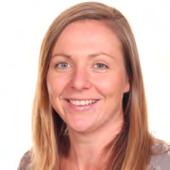
Louise Parnaby Director of Sixth Form
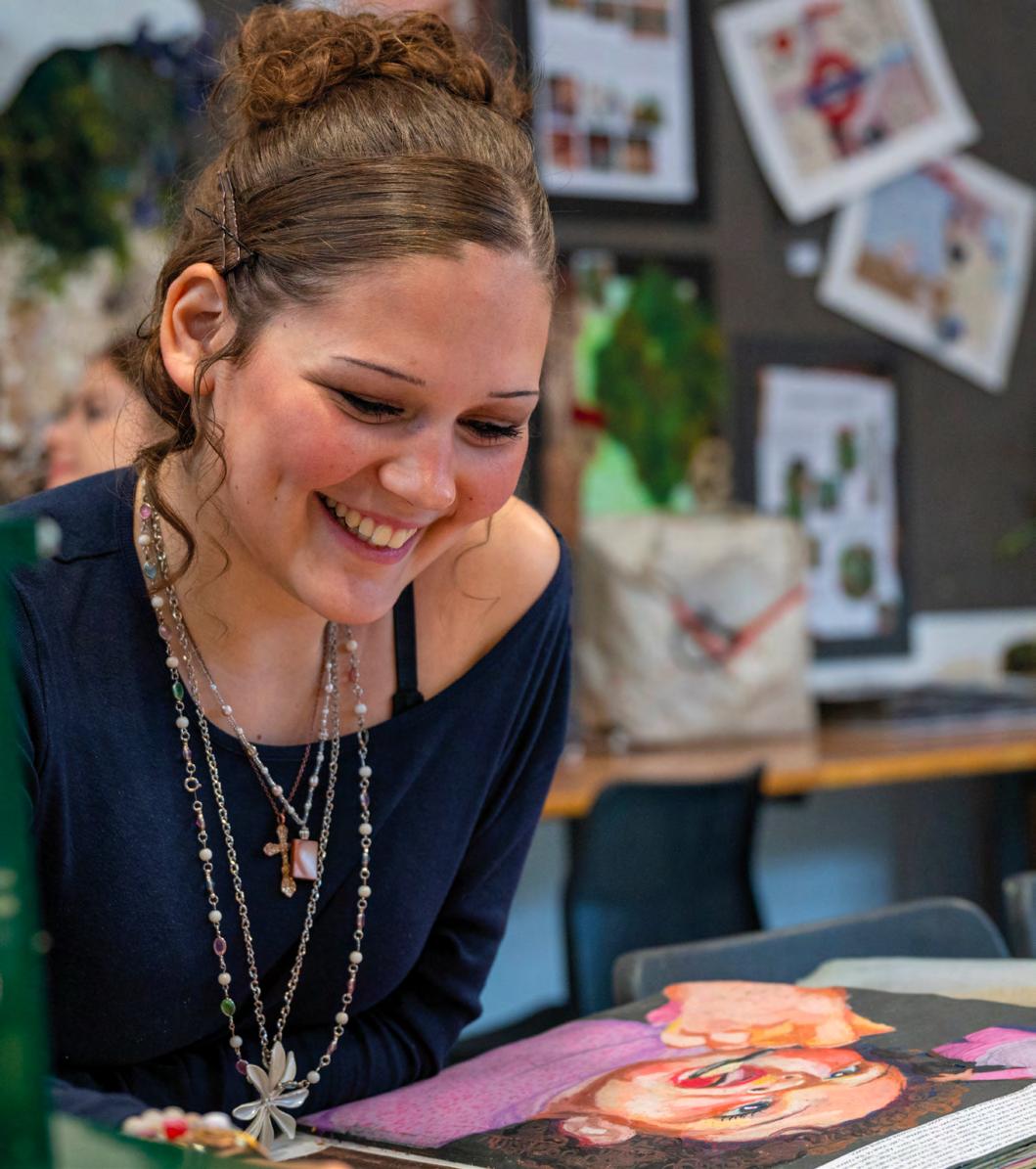





Carmel College was inspected in October 2024 and judged Outstanding. Inspectors described Carmel as “a welcoming school with a strong spirit of community” where “students flourish and achieve highly”. They praised the “ambitious curriculum developed with considerable expertise” and noted that “teachers inspire students to think deeply and develop independence”. The report highlighted that “sixth form students are excellent role models” and that “relationships between staff and students are built on trust and respect”.
We welcome students of all faiths and backgrounds. Our ethos is built on respect, diversity, and belonging, creating a safe and supportive environment where every student thrives.
We offer a broad curriculum that includes both academic A Level subjects and applied vocational courses, giving you the flexibility to shape your future. Every student receives a bespoke programme tailored to their individual needs and aspirations, ensuring the right balance of challenge and support to help you achieve your goals.
Carmel Sixth Form continues to demonstrate outstanding academic achievement, consistently delivering high levels of success across a wide range of subjects. The college is recognised nationally for its excellence, with students regularly progressing to top universities, including those in the Russell Group, as well as securing places on competitive apprenticeship programmes. This sustained performance reflects the strength of teaching, support, and ambition within the Carmel community.
With 80+ weekly enrichment activities, including sports, music, creative arts, coding, and debating, plus trips to London, Barcelona, Lourdes, and Peru, Carmel offers experiences that broaden horizons and build confidence.
Our Student Leadership Programme gives you the chance to lead clubs, organise events, and represent your peers. These roles develop confidence, resilience, and teamwork skills that employers and universities value highly.
Dedicated Sixth Form Tutors track your progress and provide personalised guidance for UCAS, apprenticeships, and careers. Our pastoral care ensures you feel supported academically and personally throughout your journey.
Study in modern science labs, a music technology suite, art studios, and a dedicated Sixth Form study building. Enjoy access to a fully equipped gym, 3G sports pitch, climbing wall, and vibrant social spaces.
Our highly qualified teachers deliver a curriculum that combines academic rigour with vocational options, ensuring you achieve at the highest level and are prepared for your next steps.
We offer a comprehensive 16–19 Bursary Scheme, free meals for eligible students, and transport assistance to remove financial barriers and ensure equal access to education.
During your time at Carmel Sixth Form you will be able to take part in a wide variety of enrichment opportunities, from volunteering to educational courses and more.

JOIN THE DEBATE AND POLITICS CLUB


TAKE PART IN PERFORMANCES
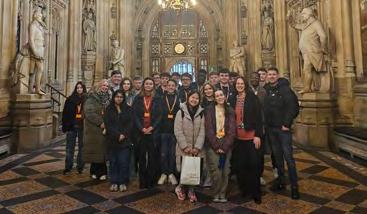
JOIN OUR COMPETITIVE ESPORTS TEAM
SUCCEED IN YOUR NEXT STEPS WITH THE SUTTON TRUST

JOIN A SPORTS TEAM: PARTICIPATE IN SPORTING ACTIVITIES
PARTICIPATE IN THE DUKE OF EDINBURGH AWARD

TAKE PART IN THE BIG PROJECT
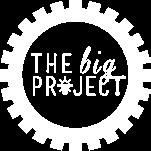
TAKE PART IN WORK
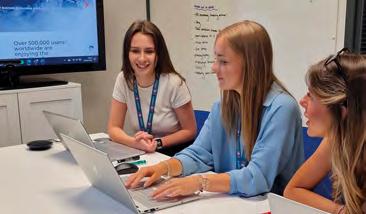



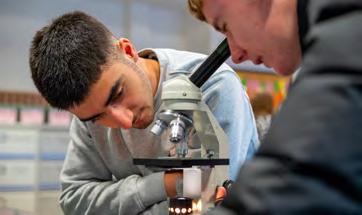

OPPORTUNITIES TO GO ON TRIPS
E.G. PERU AND LOURDES
BECOME ASPIRING LEADERS BY REFLECTING ON YOUR RESPONSIBILITY TOWARDS OTHERS AND THE PLANET
Participate in a Range of Courses from First Aid to British Sign Language BECOME PART OF THE STUDENT
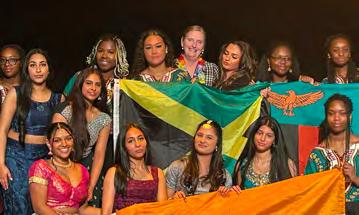


Act as a Mentor to Younger Students

COMPLETE A GOLD CREST PROJECT THAT MAKES AN ORIGINAL CONTRIBUTION TO A STEM FIELD AND MANY MORE!
Utilise Our Excellent Industry Links to Help Your Next Career Steps Support and Raise Awareness for a Charity
TAKE PART IN OUR CULTURAL FESTIVAL
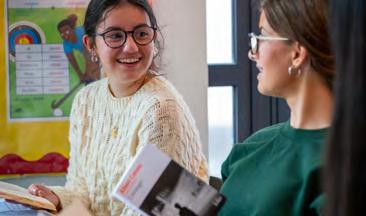
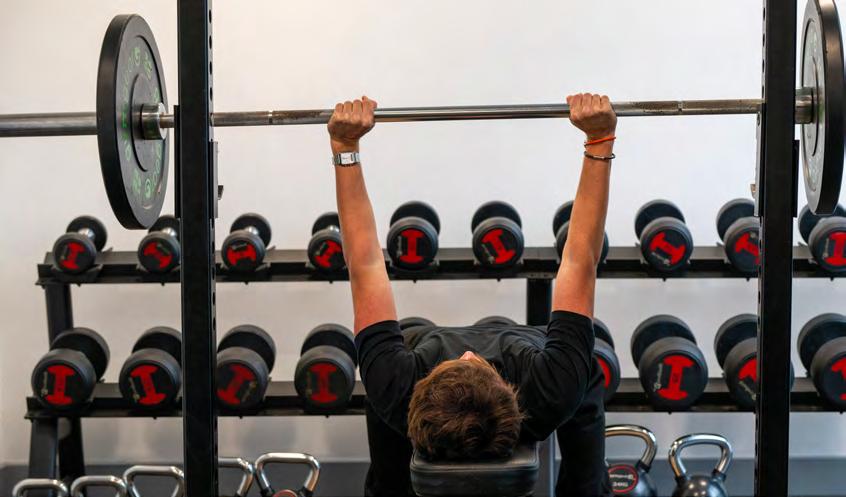


At Carmel you will spend your time in superb facilities, from the beautiful old Mansion House built back in 1864 to the brand new, purpose-built Sixth Form Study Centre.
The College provides you with dedicated spaces to study, to collaborate on group projects and to socialise during free periods. This allows you to take hold of your own learning and independence.
As a sixth former, you have it all: the best of both worlds! You have access to the entire College as well as areas that are exclusively for Sixth Form students. The College has invested substantially in ensuring students have the best possible teaching and learning environment.

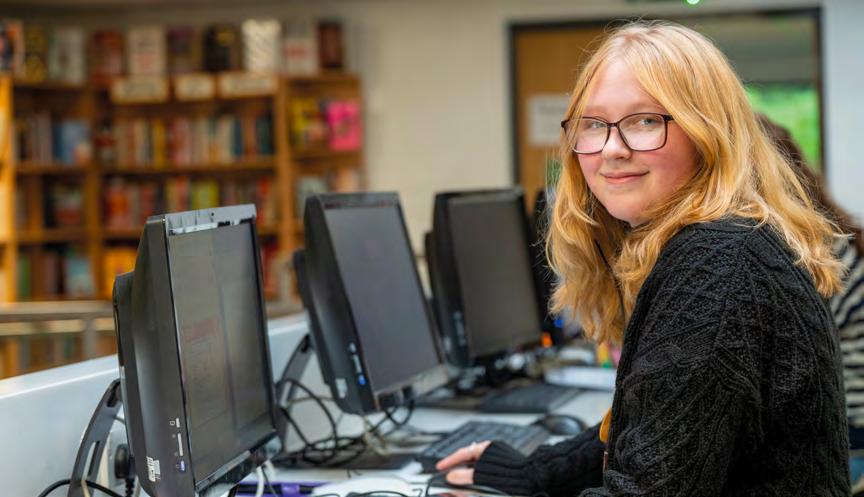
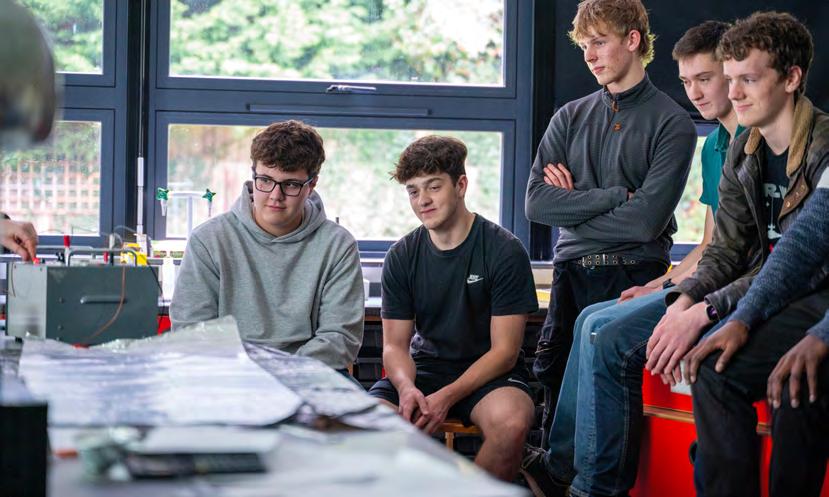
Learning Resource Centre where students can work independently throughout the day or obtain assistance with their academic work. The area is also stocked with a variety of books, journals and IT equipment needed for independent learning
and common room, where students can relax and socialise outside of lessons, equipped with a pool table, Xbox One and vending machines





Scotland:
University of Stirling
University of Strathclyde
North East:
Durham University
Newcastle University
Northumbria University
Teesside University
University of Sunderland
Northern School of Art
Yorkshire & the Humber:
Leeds Beckett University
University of Leeds
Sheffield Hallam University
York St John University
University of York
East of England:
University of Cambridge
Wales:
Bangor University
London:
Queen Mary University of London
London School of Economics
University of Westminster
North West:
Lancaster University
Liverpool John Moores University
University of Liverpool
Manchester Metropolitan University
University of Manchester
Azets
Clinivi
Busy Bees
Cawingredients
Darlington Borough Council
Office for National Statistics
Cummins
Gestamp
GSK
RAF
Metropolitan Police




*The Russell Group’s 24 members are world-class, research-intensive universities. They are unique institutions, each with their own history and ethos, but they share some distinguishing characteristics.
“My time at Carmel was nothing short of exceptional. The supportive environment allowed me to excel in my subject, which helped me begin a Marketing Apprenticeship just two months after completing my A Levels. However, Carmel taught me far more than academic content – I developed values and goals that I now apply in my daily life. The support was outstanding; I felt valued as a person, and most importantly, I enjoyed and looked forward to attending Sixth Form.”
Level 3 Multi-Channel Marketing Apprenticeship and Marketing Officer at Perry Process Equipment

“I loved every minute of Carmel Sixth Form. The teachers are experts and have a genuine interest in their field. I really feel that they go the extra mile to make sure students understand the content and can succeed in exams. Outside of the classroom, there’s an abundance to get involved with. From lunchtime clubs to trips and volunteering, Carmel helps you build knowledge outside your subject area to broaden your horizons and fill your CV. I finished Carmel with great grades, a degree-apprenticeship offer and the confidence to tackle the next challenge!”
Degree Apprenticeship in Social Research with the Department of Business and Trade

“Carmel Sixth Form provided an excellent environment for my growth, both academically and personally. From supporting me in the classroom with any subject-related questions, big or small, to mentoring me in developing leadership skills while hosting events such as our Culture Festival, the college offered guidance at every step. Carmel Sixth Form has had a greatly positive impact on my journey in education, equipping me with lifelong skills, providing lots of academic resources and support, and preparing me for university through personal discussions with teachers.”
Studying Computer Science at Newcastle University

“One of the best aspects of Carmel Sixth Form is the capacity to tailor your experience to truly cater to your aspirations. Whether needing one-on-one personal statement support, advice on next steps besides uni, or securing work experience or apprenticeships, the Sixth Form has excellent networks to fulfil this. Having initially applied for medicine, the mock interviews and visits from Carmel alumni really provided me with the skillset to become more comfortable with the application season on top of creating valuable connections with individuals in your desired area. Learning in small classes is such a big part of Carmel learning too, as teachers go above and beyond to involve every student, and to progress at the ideal pace for recall, consolidation, and introducing new content.”
Studying Arabic and French at the University of Cambridge
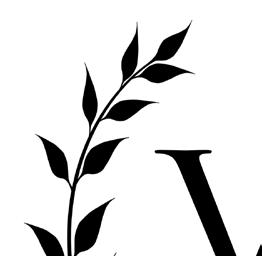

Picking the right subjects is important, it can shape your future university options and career path. At Carmel Sixth Form, we offer over 30 courses, including A Levels, BTECs, CTECs, AAQs and Level 3 qualifications. Most students choose three subjects to study over two years, with the option to take a fourth or add
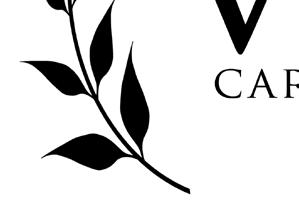

You don’t have to decide alone. Talk to your teachers, parents, and careers advisors. Think about what you’re good at, what you enjoy, and what you might want to do in the future. Understanding university and job requirements will help you

When picking your subjects, ask yourself:
• Am I good at this subject?
• Do I enjoy learning it?
• Will it help me reach my career or university goals?


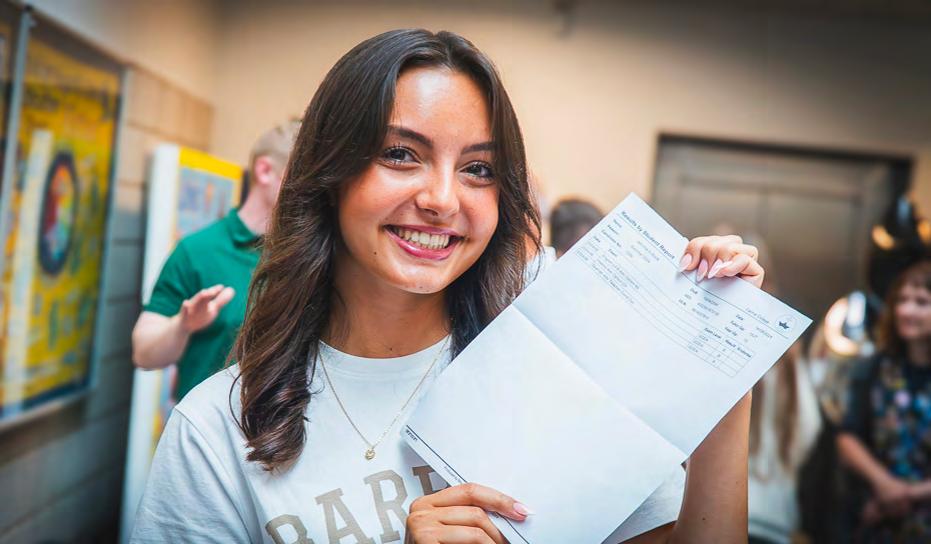





JOIN CARMEL SIXTH FORM
At Carmel Sixth Form we treat all applications in exactly the same way. Entrance to the Sixth Form is not based on religious affiliation. Any candidate who meets our conditions will be invited for a consultation and places are offered on commitment and merit. Our entry requirements are at least 5 GCSEs at grade 9-4, including English language, mathematics and any other subject-based grades specified.
We pride ourselves on attracting the best students from a wide variety of schools and look forward to receiving your application.
Scan the QR code or contact the College
One-to-one discussions about your options and interests
Sit your GCSE exams (essential for your A Level studies)
Attend lessons and workshops to experience Sixth Form life
After receiving your exam results, enrol into Carmel Sixth Form
Apply now by scanning the code or visiting carmel6.org.uk/apply
For any further information please contact the Sixth Form either via email enquiries@carmel6.org.uk or via telephone 01325 523421







We offer trips to New York, Peru, Lourdes, Barcelona, Paris, and skiing destinations
At Carmel Sixth Form, we offer a wide range of international experiences that enrich learning and broaden horizons. Students have the opportunity to travel to exciting destinations including New York, Peru, Paris, Barcelona, Lourdes, and enjoy skiing trips in Italy or Austria. These journeys support academic study, build confidence, and foster global awareness, creating unforgettable memories and preparing students for life beyond the classroom.


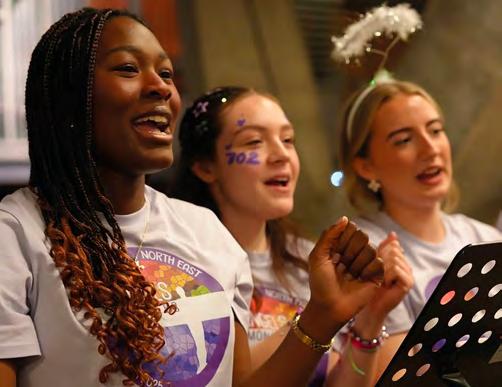











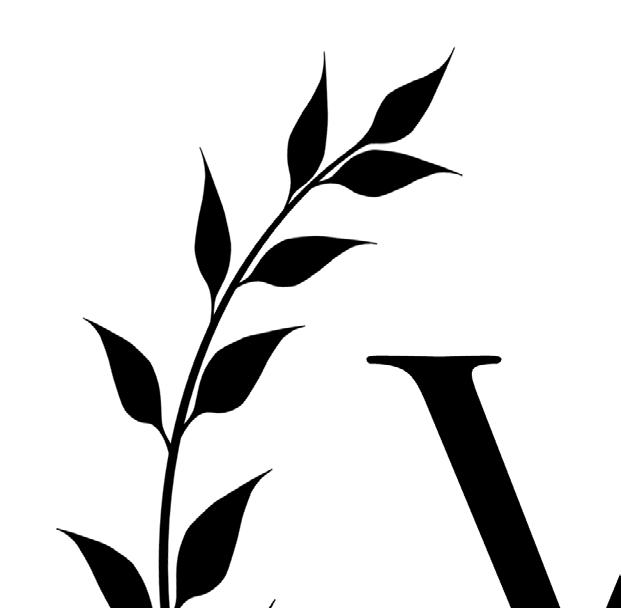


Students are required to produce two coursework units and an exam unit over the two years. Candidates will develop a coursework portfolio based on given themes, such as ‘Inside Outside’, ‘Structures’. The course requires students to work in sketchbooks, researching and developing ideas, towards a final outcome. All units of work will include looking at the work of other artists and designers, supported by visits to galleries and museums.
Teaching is directed at the needs, strengths and interests of the individual student. All units of work are tailored to allow the individual to explore original and creative solutions in any or several of the following techniques: printmaking, sculpture, photography and ICT, painting and drawing, mixed media and collage relief techniques.
There is a balance of learning activities, which include specific skill and technical instruction, self and peer assessment and one-to-one tutorials. The exam board we use is AQA and the A Level will be assessed on students’ personal investigation units worth 60%, including a 3,000 word essay and an externally set unit worth 40%, including a 15 hour practical exam. This is internally marked and externally moderated.
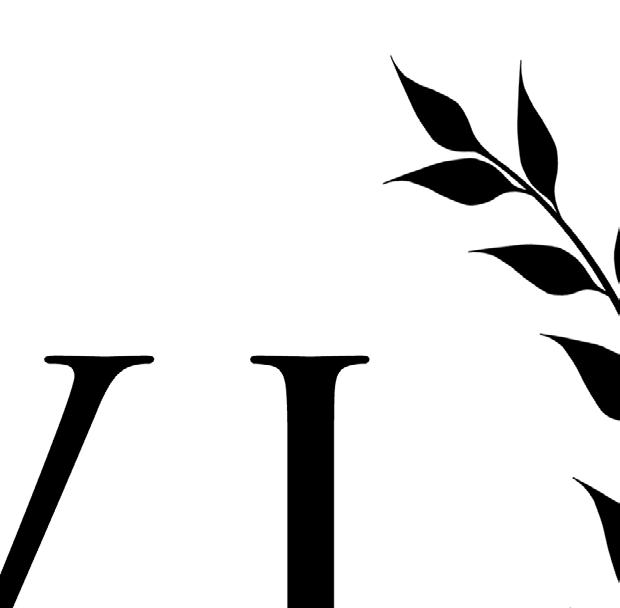

Art enhances fine motor skills, hand-eye co-ordination, problem solving skills, lateral thinking, complex analysis and critical thinking skills. No matter what career you choose, those who can arrange, present and display material in a way that is aesthetically pleasing have an advantage. Art makes us look at things anew, appreciate beauty, embrace diversity; it broadens our cultural horizons and develops our personal resources. Communicating with colour and shape and form awakens the imagination, sharpens our senses and expresses our identity. If you love making art, you’ll miss it when it’s gone. If you do choose to study A Level Art, it is likely to be your favourite class of the day.
Grade 6 in GCSE Art
CAREER POSSIBILITIES
Designer, photographer, stylist, illustrator, artist, or teacher.
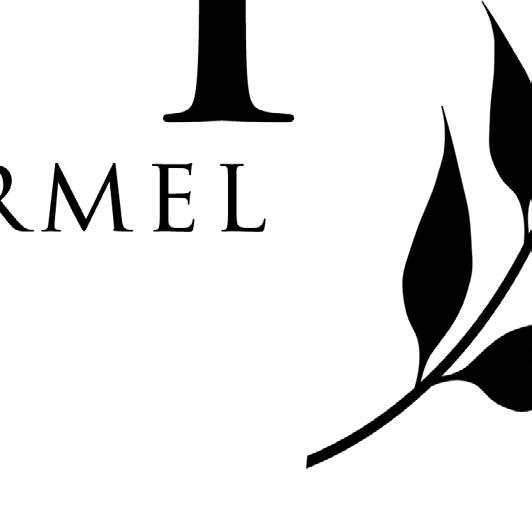
Please note: This course will run subject to sufficient student numbers. Final decisions on course availability will be made based on demand and timetabling feasibility.





For the full A Level, Year 13 Biology students will study topics including Cell Structure and Microscopy; Biochemistry; Nucleotides and Nucleic Acids; Enzymes; Biological Membranes; Cell Division; Cell Diversity and Cellular Organisation; Exchange with the Environment; Transport in Animals; Transport in Plants; The Immune System and Disease; Biodiversity; Classification and Evolution. In addition, they will cover Communication and Homeostasis; Excretion; Nervous Communication; Hormonal Communication; Responses to Change; Photosynthesis; Respiration; Genetics and Cellular Control; Patterns of Inheritance; Manipulating Genomes; Cloning and Biotechnology; Ecosystems; Populations and Sustainability. Lessons will feature demonstrations, practical work, and one-to-one support, encouraging independent study and reading.
A Level Biology also includes a practical endorsement, requiring students to develop experimental techniques and complete fieldwork, such as examining river and coastline biodiversity and learning about conservation organisations.


Biology is the science of life, offering a broad and fascinating exploration of living organisms and their interactions. It spans every level—from molecules and cells to whole organisms and ecosystems—addressing global issues such as ecology and sustainability. As the youngest of the major sciences, biology is rapidly evolving, with new discoveries emerging every day. Biological research plays a vital role in solving some of the greatest challenges of the 21st century, including climate change, food security, and disease prevention. Studying biology equips you with the knowledge and skills to contribute to these solutions and make a real impact on the world.
Please note: This course will run subject to sufficient student numbers. Final decisions on course availability will be made based on demand and timetabling feasibility.


COURSE CODE
OCR Biology A Level - H420
TYPICAL ENTRY REQUIREMENTS
Grade 6 in GCSE Maths and Grade 6 in the Biology Separate Science or Grade 5-6 in Combined Science
CAREER POSSIBILITIES
In addition to obvious career paths such as medicine, dentistry, nursing, ecology, and veterinary medicine, Biology is also highly regarded for a wide range of non-science careers and degree courses, including law, computing, accountancy, teaching, and sports science. This list is not exhaustive—there are many other careers and higher education opportunities that value Biology as a strong foundation.









The subject content enables learners to investigate different types and sizes of organisations in various business sectors and environments, drawing on local, national and global contexts. Students will develop a holistic understanding of business and enterprise and be aware of the opportunities and threats of operating in a global marketplace. They will be expected to be familiar with current issues in business and be able to investigate, analyse and evaluate contemporary business opportunities and problems in a wide range of contexts, whilst recognising how businesses adapt to operate in a dynamic business environment.
Students will gain an understanding of the important role played by small businesses in the economy and the opportunities that exist for entrepreneurs, as well as the importance of established business and not-for-profit organisations in providing goods and services. They will also apply a number of analytical techniques, including decision-making models, investment appraisal tools and ratio analysis, to investigate business opportunities and problems to determine business strategy in a range of contexts.
The following three components are all written exams worth 33% each, taken at the end of the two year course: Business Opportunities and Business Functions, Business Analysis and Strategy and Business in a Changing World. A Level Business is assessed through three components, each worth 33% and examined in a 2 hour and 15 minute written paper.


Lessons offer a range of engagement and challenging teaching and learning styles. These will be a combination of teacher-led, student-led, independent enquiry, independent research projects and mini enterprise challenges which will develop team building, communication and leadership.
Business will give you the opportunity to study a dynamic business environment, you will have the opportunity to develop a wide range of essential skills required for higher education and employment.
Please note: This course will run subject to sufficient student numbers. Final decisions on course availability will be made based on demand and timetabling feasibility.


COURSE CODE
Eduqas A Level Business - A510QSL
TYPICAL ENTRY REQUIREMENTS
Grade 5 in GCSE English
Language and a Grade 5 in GCSE Maths
CAREER POSSIBILITIES
Business management, business finance, marketing, human resource management, logistics









In Year 12, chemistry students will study Atomic Structure, Bonding, Energetics, Kinetics, Chemical Equilibria, Redox Reactions and Equations, followed by topics such as Periodicity, Groups 2 and 7 Elements, Alkanes, Halogenoalkanes, Alkenes, Alcohols and Organic Analysis.
In Year 13, students will progress to Thermodynamics, Rate Equations and Equilibrium Constants, and learn about Electrode Potentials and Electrochemical Cells, Acids and Bases, Period 3 Elements and their Oxides, Transition Metals, Reactions in Aqueous Solutions, Optical Isomerism, Aldehydes and Ketones, Carboxylic Acids, Aromatic Chemistry, Amines, Polymers, Amino Acids, Proteins and DNA, Organic Synthesis, NMR Spectroscopy and Chromatography.
Sixth form lessons will include demonstrations, practical work, lectures, handouts, ICT work and one-to-one support, with students expected to take greater responsibility for organisation and independent learning. Key skills include managing workload, note-taking, reading around the subject
At A2, there are three exam papers covering the full syllabus, with question styles ranging from multiple choice to structured and essay-style questions. Practical skills are assessed separately and reported as Pass/Fail under the Practical Endorsement, and these skills will also be assessed in


Chemistry is a fascinating and essential science that shapes almost every aspect of our lives. Often called the “central science,” it connects disciplines such as biology, physics, geology, and environmental science, making it a cornerstone of scientific understanding. Chemistry helps meet fundamental human needs—food, clothing, shelter, health, energy, and clean air and water—while driving innovations that improve our quality of life. From developing new medicines and sustainable materials to solving global challenges in energy and the environment, chemistry provides practical solutions for the real world. Studying chemistry equips you with knowledge and skills that are vital for progress and prepares you to make a meaningful impact on society.
COURSE CODE
AQA Chemistry A Level - 7405
TYPICAL ENTRY REQUIREMENTS
Grade 6 in GCSE Maths and Grade 6 in the Chemistry
Separate Science or Grade 5-6 in Combined Science
CAREER POSSIBILITIES

Please note: This course will run subject to sufficient student numbers. Final decisions on course availability will be made based on demand and timetabling feasibility.

Chemistry is a highly valuable and versatile qualification because, like all sciences, it develops essential skills such as planning, evidence gathering, analysis, and critical thinking. In addition to obvious career paths like medicine, dentistry, pharmacy, chemical engineering, and pharmaceuticals, Chemistry is also regarded favourably for a wide range of nonscience careers and higher education courses, including law, computing, accountancy, teaching, and sports science.
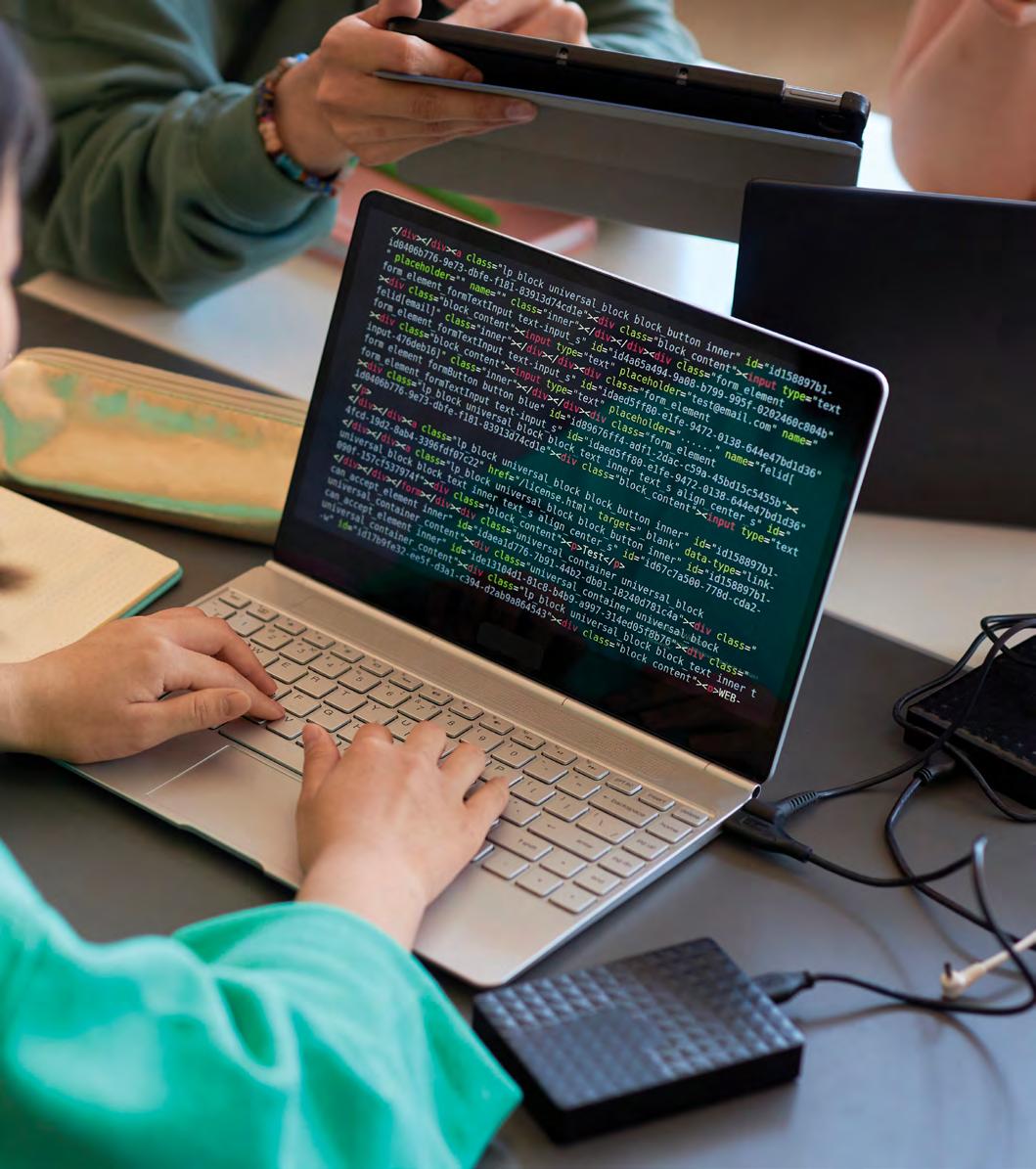








This A Level is a rigorous and engaging qualification that explores the principles and practices of computer science. Students will study three components:
Computer Systems (40%) - This unit explores the inner workings of modern computing systems, including processor architecture, memory, input/output devices, software development methodologies, and legal, moral, and ethical considerations. Students gain a deep understanding of how data is represented, manipulated, and exchanged, and how systems are designed to operate securely and efficiently.
Algorithms and Programming (40%) - This unit focuses on computational thinking and problemsolving. Students learn to design and analyse algorithms, write efficient code, and apply programming techniques to real-world scenarios. Topics include recursion, data structures, Big O notation, and standard algorithms such as sorting and searching. The emphasis is on developing logical reasoning and coding fluency.
Programming Project (Non-Exam Assessment) (20%) - In this practical component, students undertake an independent project where they identify a problem, design a solution, and implement it using a programming language of their choice. The project encourages creativity, resilience, and iterative development, and is assessed through a detailed report that includes analysis, design, development, testing, and evaluation.


Assessment is split into two written exams (each worth 40%) and one programming project (worth 20%).
Computer Science is a creative and intellectually stimulating subject that blends theory with practical application. It encourages: analytical and logical thinking, problem-solving through programming, understanding of how digital systems operate, exploration of ethical and societal impacts of technology. Students gain transferable skills that are highly valued in both academia and industry.
COURSE CODE
OCR Computer Science A Level - H446
TYPICAL ENTRY REQUIREMENTS
Grade 5 in GCSE Computer Science or Level 2 Merit in BTEC DIT
CAREER POSSIBILITIES

Please note: This course will run subject to sufficient student numbers. Final decisions on course availability will be made based on demand and timetabling feasibility.

Studying Computer Science opens doors to a wide range of careers, including software development, cybersecurity, data science, artificial intelligence, systems architecture, and web and app development. It also provides a strong foundation for further study in computing, engineering, mathematics, and related disciplines.
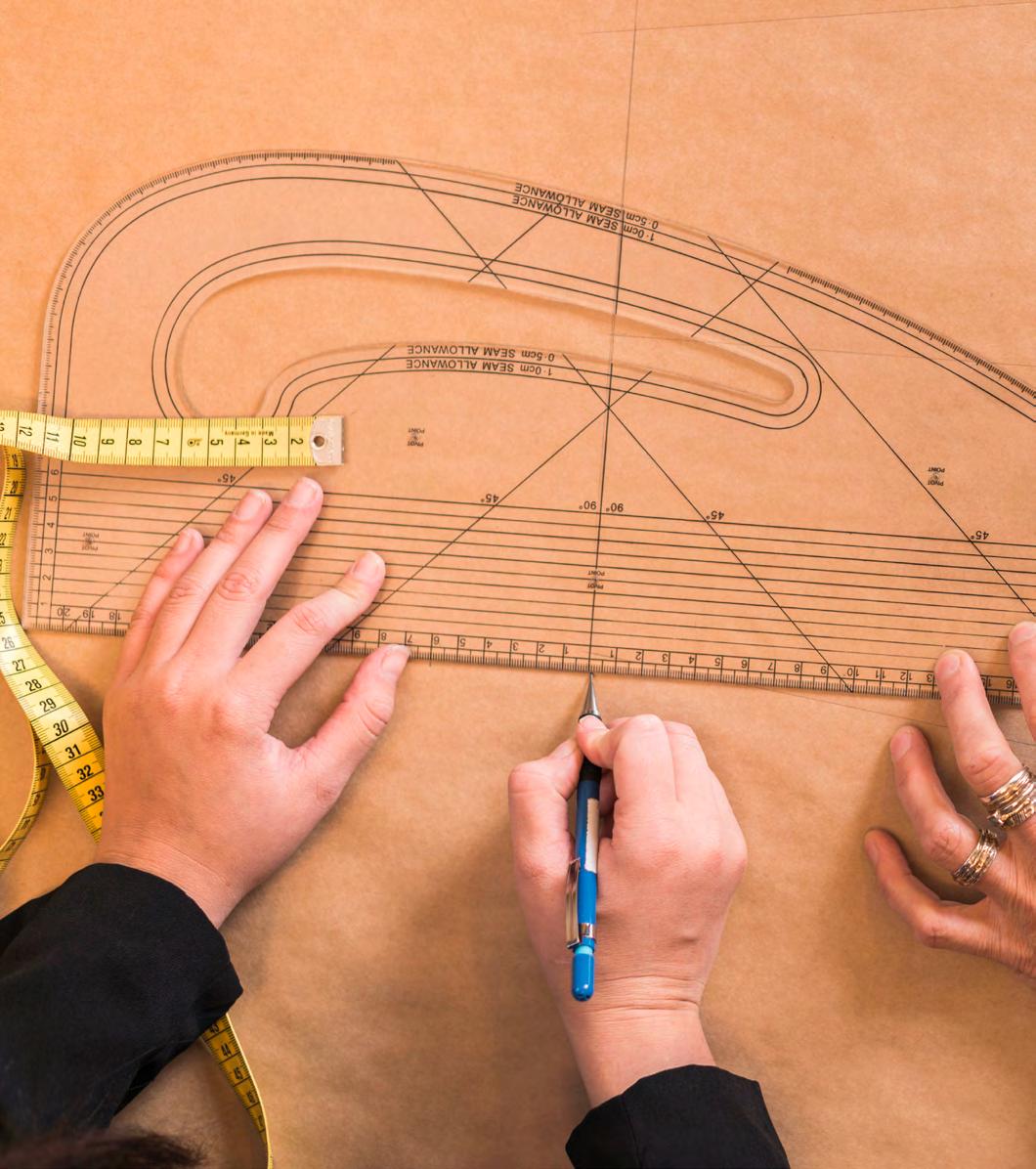








This exciting course looks at how everyday products have been designed and made. In the first year you will be introduced to the fundamentals in a range of material areas including: Timbers and Board, Metals and Alloys, Polymers and Composites. You will develop subject knowledge to understand their properties, uses and how they are manufactured in industry, alongside this you will also develop your practical skill with each material, using a range of tools, equipment and processes in our dedicated workshops and using our CAD/CAM facilities to create a range of high quality products.
For the final part of the course, and once you have acquired the required skills and subject knowledge, you will then follow the design process to design and make a high-quality product of your choice. You will carry out relevant research, consider your target audience’s needs to develop the appropriate final product, which you will manufacture and test.
Written exam: 2.5 hours - 30% of A Level
What’s assessed; Technical principles
(Mixture of short answer and extended response)
Written exam: 1.5 hours - 20% of A Level
What’s assessed; Designing and making principles
(Mixture of short answer and extended response questions)


What’s assessed; Substantial design and make project
(Written or digital design portfolio and photographic evidence of final prototype)
This creative and thought-provoking qualification will give you the practical skills, theoretical knowledge and confidence to succeed in a number of careers. Especially those in the creative industries. You will investigate historical, social, cultural, environmental and economic influences on design and technology, whilst enjoying opportunities to put your learning into practice by producing prototypes of your choice. You will gain a real understanding of what it means to be a designer, alongside the knowledge and skills sought by higher education and employers in all areas of the design industry.
Please note: This course will run subject to sufficient student numbers. Final decisions on course availability will be made based on demand and timetabling feasibility.


COURSE CODE
AQA Design and Technology A Level - 7552
TYPICAL ENTRY REQUIREMENTS
Grade 6 in GCSE Design & Technology and a 5 in GCSE Maths
The course is particularly useful to those wishing to go on to careers such as product design, architecture, automotive design, jewellery design, packaging design, and some engineering courses, as it combines creativity with a high level of technical understanding.









English Language offers students a deep dive into the structure, function, and evolution of the English Language. It explores how language is used in different contexts, how it varies across regions and social groups, and how it changes over time. Students also undertake an independent investigation and produce original writing as part of the non-exam assessment (NEA), alongside two written examinations.
The AQA A Level English Language is assessed through two exam papers and one NEA component:
Paper 1: Language, the Individual and Society
• Textual Variations and Representations: analysis and comparison of two texts (one contemporary, one older)
• Children’s Language Development: essay based on data (spoken, written, or multimodal)
• Methods of Language Analysis: integrated throughout
Paper 2: Language Diversity and Change
• Language Diversity and Change: essay on language variation or historical change


• Language Discourses: analysis of attitudes and opinions in texts
• Directed Writing: writing to present a viewpoint (e.g., article, blog post)
• Methods of Language Analysis: integrated throughout
• Regional, social, gender, and occupational varieties
• Historical language change
Language in Action (NEA)
• Independent investigation
• Original writing and commentary
Studying English Language helps students develop critical thinking, analytical precision, and excellent communication skills. It provides insight into how language shapes identity, influences society, and evolves over time. The course is intellectually stimulating and highly applicable to a wide range of academic and professional fields.


AQA English Language A Level - 7702
TYPICAL ENTRY REQUIREMENTS
Grade 5 in GCSE English Language
English Language is a versatile qualification that supports careers in journalism, publishing, law, education, marketing, and communications. It also provides a strong foundation for university courses in linguistics, English, media, and the humanities.
Please note: This course will run subject to sufficient student numbers. Final decisions on course availability will be made based on demand and timetabling feasibility.









Literature is the creation of another world; a world that we view and analyse through reading and discussion. Students who choose English Literature are not just looking to study a subject that is recognised and sought after by institutions of higher education, they are also fascinated by the variation of writing on offer.
Students who study A Level English Literature will explore works established as part of the literary canon, as well as exciting, innovative texts from a variety of voices and cultures. Genre study is at the heart of A Level English Literature. From the jealously fuelled furore of Shakespeare’s Othello to the kite fighting redemption of Hosseini’s Afghanistan, students will study a range of prose, drama and poetry texts through the lens of either tragedy or political and social protest writing. Students will also study a range of critical theory, including feminism and Marxism, and apply these to poetry and prose texts of their own choosing as part of their coursework area of study.
Othello- William Shakespeare | The Great Gatsby – F.Scott Fitzgerald
Richard II – William Shakespeare
Social and Political Protest


The Handmaid’s Tale – Margaret Atwood | The Kite Runner – Khaled Hosseini
Songs of Innocence and Experience – William Blake
A Level English Literature offers students the opportunity to develop inference and deduction skills which are particularly useful to careers and courses that require you to break down rhetoric and formulate an informed argument. The content of the course enables students to explore the study of literature through the lens of genre and theory, which in turn encourages the independent study of a range of texts within a shared context. This unifying approach facilitates the inclusion of a range of wider reading, thus extending students’ experience and appreciation of literature beyond core set texts. This course allows students the autonomy to explore, debate and tackle challenging literary concepts and shape their understanding of the world around them.
COURSE CODE
AQA English Literature A Level7717AB
TYPICAL ENTRY REQUIREMENTS
Grade 5 in GCSE English Literature
CAREER POSSIBILITIES

Please note: This course will run subject to sufficient student numbers. Final decisions on course availability will be made based on demand and timetabling feasibility.

English Literature is well regarded by universities and because the course has both practical and analytical content is suited to a wide range of careers such as journalism, writing, teaching as well as careers in marketing and design and other artistic, literary and media occupations. Careers that centre on the ability to debate and evaluate evidence, such as those in the field of law, politics and other areas of humanities would find A Level English Literature a useful course to pursue. Alternatively, students’ immersion in a range of texts from across the literary canon will provide excellent framework from which to develop a career in the arts.




The Extended Project Qualification (EPQ) is a stand-alone qualification designed to extend and develop students’ skills in independent research and project management. The EPQ is awarded UCAS points worth half an A Level and is recognised by universities and employers; some leading universities make alternative offers to students undertaking an EPQ.
The EPQ requires students to carry out research on a topic that they have chosen and is not covered by other qualifications. They then use this research to produce a written report and, in the case of practical projects, an artefact or a production. A student can take inspiration from something studied in class or something completely unrelated to their studies.


Students work independently with a staff supervisor for an hour a week to undertake a research project of their choice, producing either a 5,000 word research project or an artefact supported by a 1,000 word research document.
The assessment rewards the learning process over the final product; a successful EPQ student will need the skills to work independently. All our students, no matter what their course of study, are able to add this qualification to their programme.
The EPQ is an independent research project where you can learn about and begin to develop the higher level skills that are essential for university study. You can visit university libraries to gain an insight into the size and scale of them and to experience studying in that environment. The EPQ is increasingly popular with universities looking for candidates who can demonstrate their ability to conduct detailed, independent research in the manner that is expected of a higher education student.


COURSE CODE
AQA Extended Project - 7993
TYPICAL ENTRY REQUIREMENTS
Grade 5 in GCSE English Language
CAREER POSSIBILITIES
The EPQ is a great addition to any CV as you can tailor the research topic to suit your needs. This allows you to focus on your own area of interest and spend time investigating this in detail, achieving a qualification, as well as developing the skills, knowledge and confidence that will help you in both job and university interviews.
Please note: This course will run subject to sufficient student numbers. Final decisions on course availability will be made based on demand and timetabling feasibility.









The AQA A Level French course offers an exciting and intellectually stimulating journey into language, culture, and society across the French-speaking world. It is designed to develop confident, fluent communication and a deep understanding of how language reflects and shapes identity, values, and global perspectives. Students will explore a wide range of themes, including family and relationships, technological change, volunteering and social engagement, music and cinema, heritage and diversity, crime and justice, and political participation. These topics provide insight into contemporary issues and cultural traditions in France and other Francophone countries.
The course also introduces students to authentic materials, such as newspaper articles, podcasts, films, and literary texts, enabling them to interpret and respond to real-world content. You will study one major work of literature and one film in depth, analysing themes, characters, and stylistic features, and writing essays that demonstrate critical thinking and linguistic precision.
Assessment is through three components:
• Paper 1: Listening, Reading and Writing (50%) – testing comprehension of spoken and written French and translation skills.
• Paper 2: Writing (20%) – two essays: one on the set text and one on the set film.

• Paper 3: Speaking (30%) – a discussion based on a stimulus card and an Independent Research Project on a topic of your choice, giving you the opportunity to design and present your own study.

Studying A Level French opens doors to a world of opportunity. It is not just about mastering grammar and vocabulary—it is about gaining a global perspective and understanding how language connects people and cultures. You will develop high-level communication skills, critical thinking, and analytical abilities that are highly valued by universities and employers.
French is spoken on five continents and is an official language of many international organizations, including the United Nations and the European Union. This makes it an asset for careers in business, law, diplomacy, journalism, tourism, international development, and beyond. The course also offers fascinating insights into Francophone cultures, film and literature, and current social and political issues, helping you become a more confident, culturally aware, and adaptable learner.


COURSE CODE
AQA French A Level - 7652
TYPICAL ENTRY REQUIREMENTS
Grade 5 in GCSE French
CAREER POSSIBILITIES
An A Level in French opens up a world of global career opportunities. It’s highly valued by employers for the communication, adaptability, and cultural awareness it develops. French can take you into international business, law, diplomacy, journalism, education, tourism, or work with global organisations and NGOs. As one of the world’s most widely spoken and influential languages, French gives you a competitive edge and the confidence to connect with people and opportunities across the globe.
Please note: This course will run subject to sufficient student numbers. Final decisions on course availability will be made based on demand and timetabling feasibility.









Geography at A Level offers an exciting and varied exploration of the world’s physical and human systems. You will investigate how landscapes are shaped, how global connections influence societies, and how environmental processes sustain life on Earth. On the physical side, topics include Water and Carbon Cycles, Coastal Landscapes and Change, and Tectonic Processes and Hazards, giving you insight into the science behind Earth’s dynamic systems and the risks posed by natural hazards.
Human geography focuses on global challenges and power structures through Globalisation, Superpowers, Health, Human Rights and Intervention, and Regenerating Places, helping you understand how economies, cultures, and politics interact in an increasingly interconnected world.
Fieldwork is central to the course, with four days in contrasting environments where you will collect and analyse data to support your learning. You will also complete an Independent Investigation, a 3,000 – 4,000 word research project on a topic of your choice - an opportunity to design and carry out your own study. Assessment combines three written exams with this coursework component, ensuring a balance of knowledge, application, and independent enquiry.


Geography is one of the most relevant and forward-thinking subjects you can choose. It helps you understand the world’s most pressing challenges - climate change, globalisation, resource security, and inequality - and equips you with the knowledge and skills to make sense of them. This is a subject for students who want to engage with real-world issues and develop solutions that matter.
Studying Geography develops a unique combination of skills: critical thinking, data analysis, problem-solving, and independent research. These are highly valued by universities and employers because they show you can interpret complex information, think strategically, and communicate effectively. Geography is often called a “bridging subject” because it combines scientific understanding with social, economic, and political insight, making it ideal for students who want flexibility in their future choices.
Geography also offers variety - no two lessons are the same. You’ll debate global power shifts, analyse climate data, explore health inequalities, and carry out fieldwork in contrasting environments. It pairs well with subjects such as Biology, Business Studies, Mathematics, Psychology, History, Sociology and Computer Science, opening pathways to degrees in environmental science, sustainability, global development, and data analytics. If you are curious about the world and want a subject that is relevant, respected, and full of opportunities, Geography is the perfect choice.


COURSE CODE
Edexcel Geography A Level –9GE0
TYPICAL ENTRY REQUIREMENTS
Grade 5 in GCSE Geography
CAREER POSSIBILITIES
Geography opens doors to careers in environmental management, urban and transport planning, international development, meteorology, and GIS technologies. Its versatility means it supports progression into science, medicine, social science, and data-driven roles, making geographers highly employable in a wide range of sectors.
Please note: This course will run subject to sufficient student numbers. Final decisions on course availability will be made based on demand and timetabling feasibility.
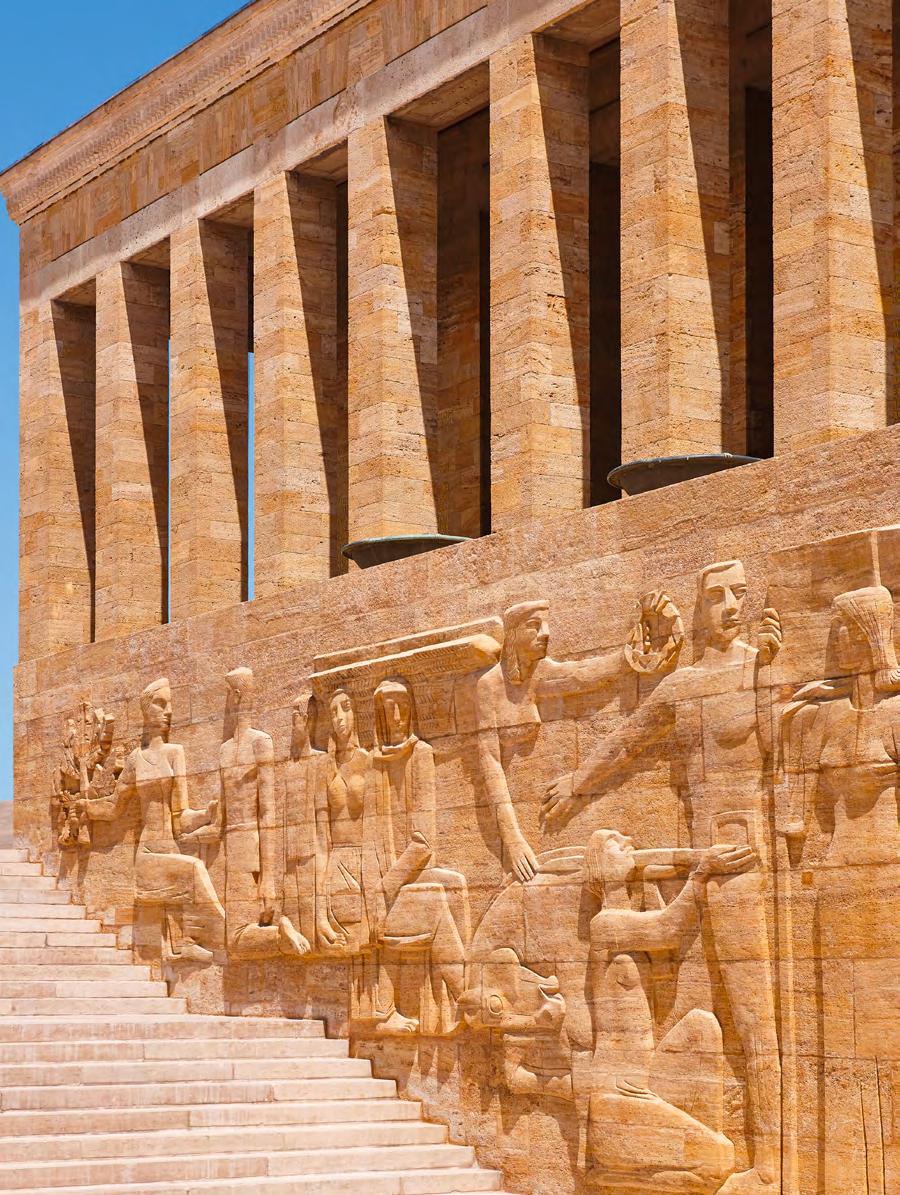








A Level history at Carmel offers students the opportunity to study 3 topics in great detail over the
The Tudors: England, 1485-1603
France in Revolution, 1774-1815
Personal Enquiry
In Year 12, students study Henry VII and Henry VIII, as well as the background to the French Revolution and the Revolution itself. For example, students debate the factors leading to Tudor Rebellions, riots in Paris, the outbreaks of war and the numerous consequences, while in Year 13 they continue to study Elizabeth’s reign, as well as Napoleon’s rule. In Year 13, students also undertake a personal enquiry of 4000-4500 words, covering 100 years of history from a choice of options.
Teaching at A Level takes on many forms including lectures, presentations, group work and project work. The course is a 2-year programme of study. At the end of the 2 year course, students need to submit their personal enquiry as well as sit 2 x 2.5 hour examinations on the topics covered in the two years of study.


History is not only about the past. History is understanding where we are now, how we got here, understanding the mistakes and the successes that have been made and seeing how the past shapes our world today. It also offers the opportunity to study some fascinating and interesting areas of history, the individuals who shaped it and to see correlations between events from hundreds of years ago and their sometimes frightening similarity to today.
Please note: This course will run subject to sufficient student numbers. Final decisions on course availability will be made based on demand and timetabling feasibility.


COURSE CODE
AQA History A Level - 7042CH
TYPICAL ENTRY REQUIREMENTS
Grade 6 in GCSE History (if taken) or a 6 in GCSE English Language if not taken (it is not necessary to have taken History at GCSE to study it at A level)
History opens doors to a wide range of careers, both directly related to the subject and in fields where its transferable skills are highly valued. These include law, archaeology, museum work, teaching (primary and secondary), university lecturing, civil service, politics, and journalism. It also complements other written subjects such as English, Geography, Philosophy, and Ethics, and is a popular choice for students studying sciences and maths who want a contrasting subject that develops analytical thinking and extensive written communication skills.
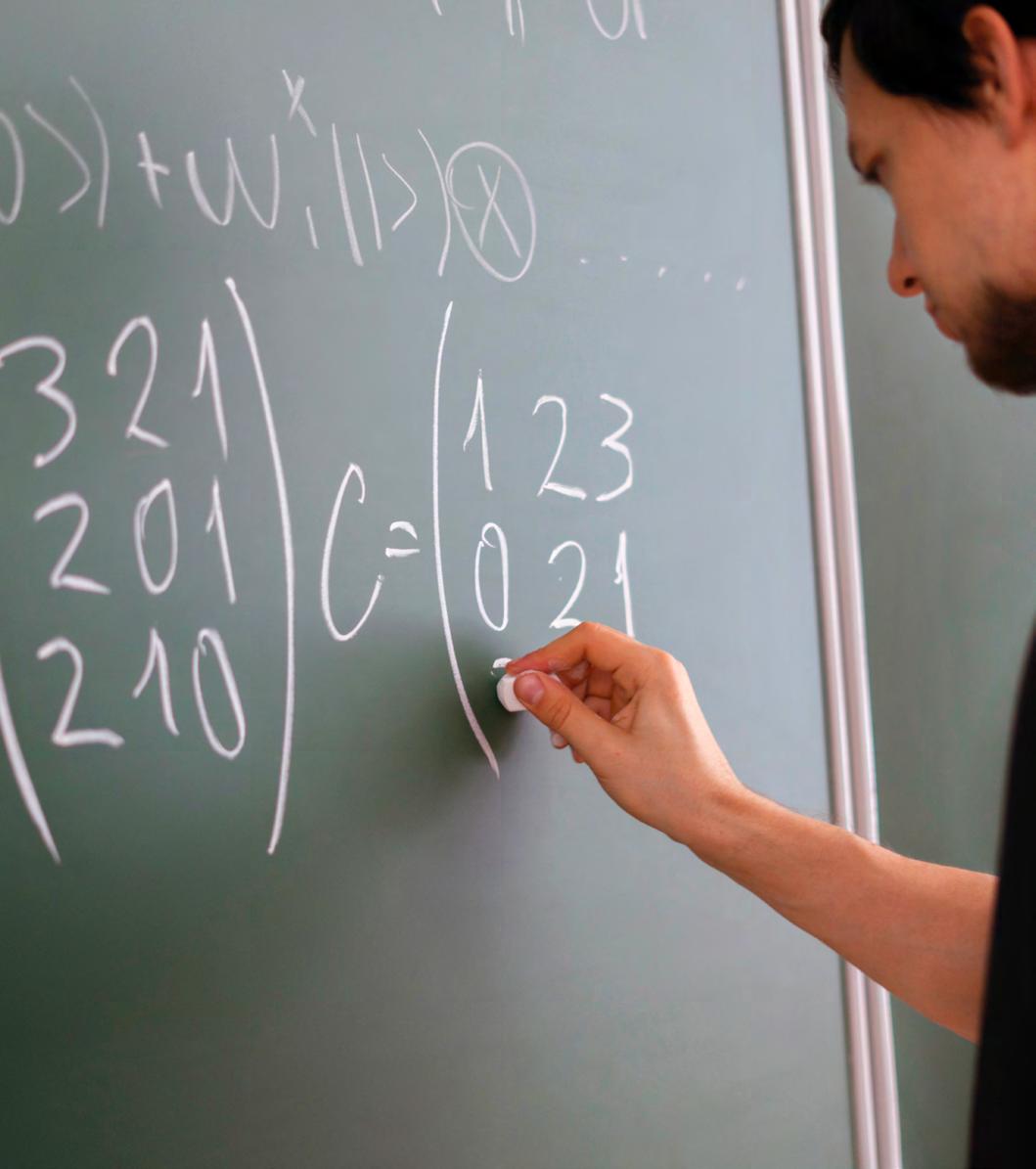








The course provides a broad and widely applicable base of mathematical knowledge, including rigorous treatment of calculus and proof alongside statistics and mechanics, preparing learners for a wide range of destinations in higher education and employment. All aspects of the course are compulsory. It emphasises how mathematical ideas are interconnected and how mathematics can be applied to model situations mathematically, using algebra and other representations, to help make sense of data, to understand the physical world and to solve problems in a variety of contexts, including social sciences and business.
The mechanics element of the course strongly supports students studying physics. A new feature of A Level maths will be to use a large data set of pre-released material, which will be used throughout the course. It will be necessary for students to purchase a new calculator with specific functions that will allow them to work with real data and explore it with appropriate technology.
We strongly recommend that students wait before beginning the course when they will be advised on which calculator to purchase. Students will find A Level lessons similar to those at GCSE, with the teacher introducing a topic and demonstrating how to solve problems with students contributing to solutions. Regular homework is set to allow students to practise and consolidate their learning.


If you enjoy mathematics and are confident with the work you have met so far at GCSE, A Level Mathematics could be the course for you. Students enjoy its challenge, its clarity and the fact that you know when you are right. The solution of a problem has an excitement and a satisfaction. Mathematics is good training for the mind, helping to develop logical thinking and problem-solving skills – the kind of analytical processes that have helped solve problems of all kinds for thousands of years. It is a demanding and challenging subject but it can be an extremely rewarding one if you are prepared to put in time and effort. Mathematics is classed by the Russell Group Universities as a facilitating subject for maths and science-based degree courses.
Please note: This course will run subject to sufficient student numbers. Final decisions on course availability will be made based on demand and timetabling feasibility.


OCR Mathematics A LevelH240
Grade 7 in GCSE Maths
CAREER POSSIBILITIES
A Level mathematics complements and supports many other subjects at A Level including Sciences, Social Sciences, Geography and Economics, or you may choose to study it simply because you enjoy it. Students at Carmel who have studied A Level mathematics have gone on to study a wide variety of undergraduate courses ranging from fashion buying to illustration, as well as more traditional subjects such as engineering, medicine and law. Research has shown that students who have studied A Level Mathematics have gone on to earn 10% more than those who didn’t.
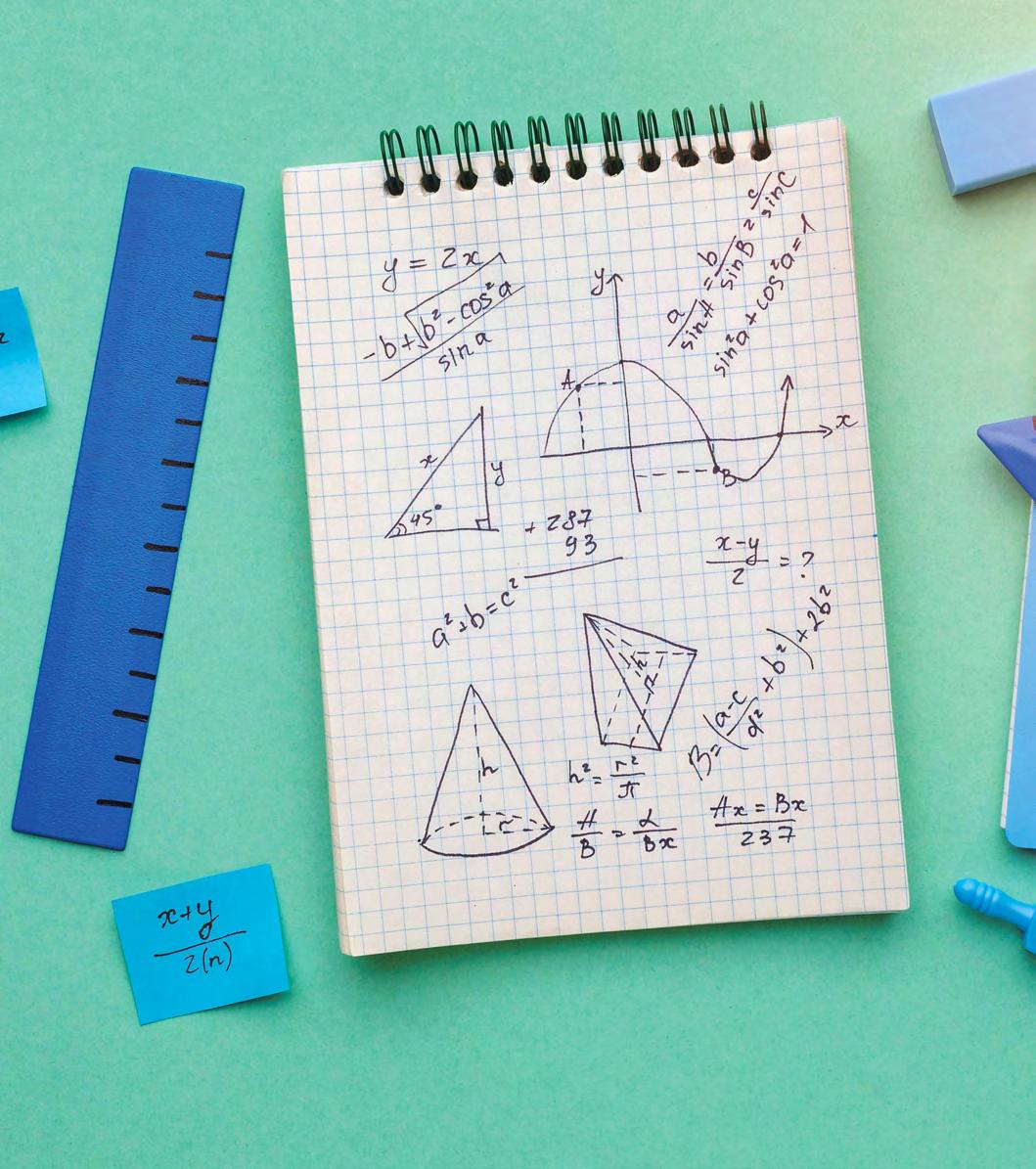








Further Mathematics is a second A Level in Mathematics which can only be studied if A Level Mathematics is also being studied. Further Mathematics both extends and deepens your knowledge and understanding beyond the standard A Level Mathematics.
Students will study different areas of pure mathematics, mechanics and statistics than in A Level Mathematics. Students will broaden their knowledge into other areas of pure mathematics, that underpin further study, with Complex Numbers, Matrices, Polar Coordinates and Hyperbolic Functions.
In statistics, content includes: Combinatorics, Probability Distributions for Discrete and Continuous Random Variables, Hypothesis Tests and Confidence Intervals for a Population Mean, Squared Tests, Non-Parametric Tests, Correlation and Regression.
In mechanics, students use their extended pure mathematical knowledge to explore more complex physical systems. The area covers: Dimensional Analysis, Work, Energy, Power, Impulse, Momentum, Centres of Mass, Circular Motion and Variable Force.
Students gain two A Levels, one in Mathematics and one in Further Mathematics and consequently have twice as many maths lessons as A Level maths students.


Further Mathematics is an ideal subject for the most academic students who wish to immerse themselves in maths. Students who take Further Mathematics are generally students who can master the more demanding concepts in GCSE mathematics quickly and easily.
Students find that the additional time spent studying mathematics boosts their marks in A Level Mathematics. It makes the transition from sixth form to university courses, which are mathematically rich, that much easier as much of the first year course content will be familiar. If you are planning to take a degree such as Engineering, Sciences, Computing, Finance, Economics, or perhaps Mathematics itself, at the more selective universities, you will benefit enormously from taking Further Mathematics.
Further Mathematics introduces new topics such as matrices and complex numbers that are vital in many STEM degrees. Students who have studied Further Mathematics find the transition to such degrees far more straightforward.
Please note: This course will run subject to sufficient student numbers. Final decisions on course availability will be made based on demand and timetabling feasibility.


COURSE CODE
OCR Further Mathematics A Level - H245
TYPICAL ENTRY REQUIREMENTS
Grade 8 in GCSE Maths
CAREER POSSIBILITIES
Universities and future employers recognise students who have studied Further Mathematics as highly capable mathematicians, which strengthens applications for courses and jobs. At Carmel, students who have completed A Level Further Mathematics have progressed to a wide variety of undergraduate courses, ranging from medicine and music to more traditional subjects such as mathematics, physics, and engineering. Increasingly, Further Mathematics students are also securing degree apprenticeships in fields such as engineering, data science, and accountancy with leading employers including Dyson, Land Rover, and the Office for National Statistics.
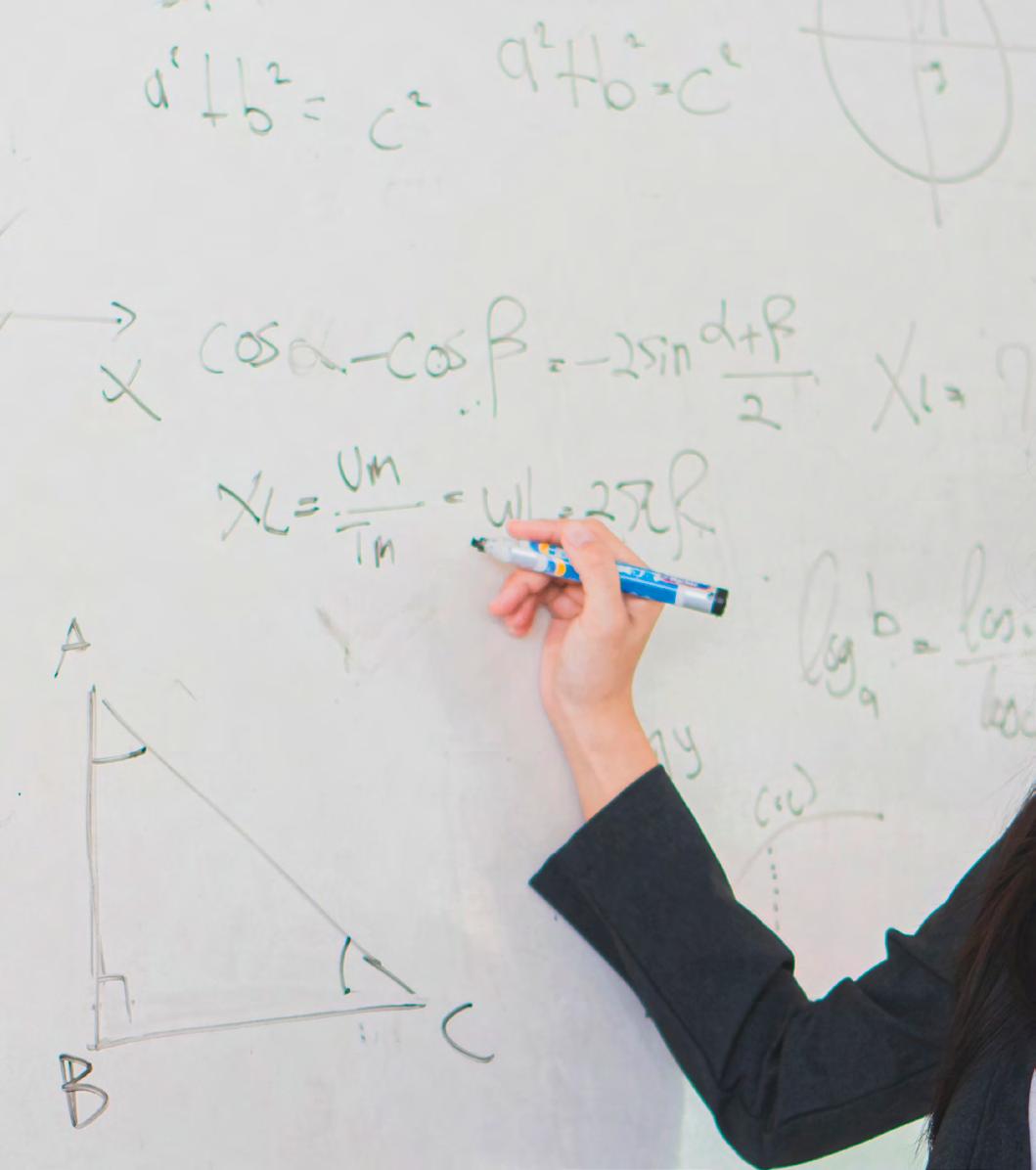








1. Analysis of Data
• Interpreting and comparing data sets
• Understanding correlation and causation
• Using statistical techniques to draw conclusions
2. Mathematics for Personal Finance
• Managing money: tax, loans, savings, and budgeting
• Understanding interest rates, inflation, and financial planning
• Making informed financial decisions
3. Estimation
• Making sensible approximations
• Evaluating the accuracy of estimates
• Applying estimation in real-world contexts


• 4. Critical Analysis of Given Data and Models
• Identifying misleading statistics
• Evaluating assumptions and models
• Interpreting graphs and data in context
5. Statistical Techniques
• The Normal Distribution and its properties
• Correlation and regression analysis Assessment
• Two written exams at the end of Year 12
• Each paper is 1 hour 30 minutes
• No coursework
This course is ideal for students who want to continue developing their mathematical skills beyond GCSE but are not taking A Level Mathematics.
Mathematical Studies is a Level 3 qualification equivalent to an AS Level and is highly respected by universities and employers for its focus on practical, real-world applications.
Core Maths helps students become confident in handling data, interpreting statistics, and applying mathematical reasoning to everyday problems. It supports academic study and future careers by developing transferable skills in numeracy and analysis.
COURSE CODE
AQA Level 3 Mathematical Studies - 1350
TYPICAL ENTRY REQUIREMENTS
Grade 5 in GCSE Maths
CAREER POSSIBILITIES
Core Maths supports a wide range of university courses and careers. It is particularly useful for:

Please note: This course will run subject to sufficient student numbers. Final decisions on course availability will be made based on demand and timetabling feasibility.

Psychology, biology, and geography
• Business, economics, and sociology
• Data science, research, and analytics
Any career requiring confident use of statistics and data interpretation









The AQA A Level Media Studies course offers students a dynamic and engaging exploration of the media’s role in contemporary society. Through a combination of theoretical analysis and practical production, students investigate how media products are constructed, how they represent the world, and how audiences interact with them. The course includes two written examinations and a non-exam assessment (NEA), which involves creating a cross-media production in response to a brief set by AQA.
The course is structured around four key theoretical frameworks and a range of media forms:
Media Language
• How media communicates meaning through codes and conventions
• Semiotics, narrative, genre, technical elements (camera, editing, sound, mise-en-scène)
Media Representation
• How people, places, events, and issues are portrayed


• Stereotypes, identity, gender, ethnicity, age, and ideology
Media Industries
• How media is produced, distributed, and regulated
• Ownership, convergence, funding, and institutional practices
Media Audiences
• How audiences are targeted and respond to media
• Audience theory, active/passive consumption, demographics, psychographics
COURSE CODE
AQA Media Studies A Level7572
TYPICAL ENTRY REQUIREMENTS
Grade 4 in GCSE English Language
CAREER POSSIBILITIES
Media Studies is a subject that encourages students to think critically about the world around them. It develops analytical skills, creativity, and cultural awareness, making it highly relevant in today’s media-saturated environment. Students gain insight into how media influences public opinion, identity, and society, while also learning practical skills in media production. This subject is ideal for those interested in journalism, film, advertising, or digital content creation.
Please note: This course will run subject to sufficient student numbers. Final decisions on course availability will be made based on demand and timetabling feasibility.


A qualification in Media Studies opens doors to a wide range of careers in the creative industries. Graduates often pursue roles in journalism, television and film production, advertising, public relations, social media management, and media research. The course also provides a strong foundation for further study in media, communications, and cultural studies.









Like GCSE Art, this course requires students to work in sketchbooks researching and developing ideas towards a final outcome. All units of work will include looking at the work of other photographers, artists and designers. This is supported by photography field trips and visits to galleries. Teaching is directed at the needs, strengths and interests of the individual student. All units of work are tailored to allow the individual to explore original and creative solutions in any or several of the following area(s) of Photography, such as: Portraiture, Documentary, Photo-Journalism, Environmental Photography, Still Life or Experimental Imagery.
Students will be introduced to a variety of experiences exploring a range of photographic techniques including digital as well as traditional black and white (silver halide) chemical technique.
Students will develop skills in the following:
• The ability to explore elements of visual language, line, form, colour, pattern and texture in the context of photography.
• Responding to an issue, theme, concept or idea or working to a brief.
• An appreciation of viewpoint, composition, depth of field and movement; time- based, through such techniques as sequence or frozen moment.
• The appropriate use of the camera, film, lenses, filters and lighting for work in their chosen area of photography.


• An understanding of techniques related to the developing and printing of photographic images, presentation, layout and mounting.
The exam board we use is AQA and the A Level will be assessed on a student’s personal investigation unit worth 60%, including a 3,000 word essay and an externally set unit worth 40%, including a 15 hour practical exam. This is internally marked and externally moderated.
Through photography we learn to be perceptive, to observe and see interesting things in the world around us. We learn to find the extraordinary in ordinary places. Studying photography develops skills of creative thinking, critical analysis, perseverance, patience, reflection, independent enquiry, collaboration and self-motivation.


AQA Photography AS - 7246/C 7246/X
AQA Photography A Level - 7206/C 7206/X
Grade 4 in GCSE Photography. However we will consider anyone who has a genuine interest in photography who has not done an art GCSE subject
Entry to a Foundation course in Art and Design and / or Degree entry into a specialised area. There is a wide variety of careers that you could follow with a photography qualification.
Please note: This course will run subject to sufficient student numbers. Final decisions on course availability will be made based on demand and timetabling feasibility.









Students will study the following topics during the course: Applied anatomy and physiology; Skill acquisition; Sport and society; Exercise physiology; Biomechanical movement; Sport psychology; Sport and society and the role of technology in physical activity and sport.
performance in physical activity and sport. Students assessed as a performer or coach in the fullsided version of one activity and written/verbal analysis of performance. The style of teaching for this course is a teacher-centred approach through direct teacher instruction and student-centred approach, through enquirybased and cooperative learning.
The AS assessment includes:
2 hour written paper. 70% of AS level. 84 marks for Factors affecting participation in physical
Non-exam assessment: 30% of AS-level. 45 Marks for practical performance in physical activity and sport: Students assessed as a performer in the full sided version of one activity. 45 marks for written/ verbal analysis of performance. Internal assessment, external moderation.
The A Level assessment includes:
2 hour written paper 35% of A Level. Factors affecting participation in physical activity and sport. 105 marks- Applied anatomy and physiology, Skill acquisition, Sport and society.

Component 2: 2 hour written paper 35% of A Level. Factors affecting optimal performance in physical activity and sport. 105 marks - Exercise physiology and biomechanics, Sports psychology, Sport society and

Practical performance in physical activity and sport. 30% of A Level. Internal assessment, externally moderated. 90 marks total. 45 marks Practical Performance and 45 marks Analysis and Evaluation.
This study will enhance your knowledge and experience of PE and Sport, as well as giving you a deeper understanding of health issues. This A Level offers a multi-disciplinary approach to the study of and participation in sport, play, leisure and recreation, allowing you to study movement, performance and behaviour, in relation to PE. You should enjoy science and looking at how the human body and mind is affected by sport participation and performance and you should also be interested in the place of PE and sport in our society and how the subject has developed opportunities for participation. It goes without saying that you must also enjoy developing and acquiring skills and techniques in a variety of physical activities.
Please note: This course will run subject to sufficient student numbers. Final decisions on course availability will be made based on demand and timetabling feasibility.


COURSE CODE
AQA Physical Education A Level - 7582
TYPICAL ENTRY REQUIREMENTS
Grade 5 in GCSE PE (if taken), Grade 5 in GCSE English Language and Grade 5 in GCSE Science. You should also perform at club level in your chosen sport
If you’re keen on sport, you can make a healthy living from your passion. Whether that’s working for a football club, as a Personal Trainer at the local gym, or training to be a physiotherapist, there are lots of opportunities. From professional sport through to amateur teams and individuals who just want to get in shape, sport and fitness is a fast-growing business. Best of all, you could be in a career doing something that you love. PE goes well with other subjects. If you want a career in physical education, you might also consider Biology and Psychology.









In Year 12, physics students will study topics such as Physical Quantities and Units, Making Measurements and Analysing Data, Nature of Quantities, Motion, Forces in Action, Work, Energy and Power, as well as Materials, Momentum, Charge and Current, Energy, Power and Resistance, Electrical Circuits, Waves, and Quantum Physics.
In Year 13, students will progress to Thermal Physics, Circular Motion, Oscillations, Gravitational Fields, Astrophysics and Cosmology, Capacitors, Electric Fields, Electromagnetism, Nuclear and Particle Physics, and Medical Imaging. Lessons during sixth form will include a variety of teaching methods such as demonstrations, practical work, lectures, handouts, ICT work, and one-to-one support.
Students are expected to take greater responsibility for their learning compared to GCSE, focusing on organisation, workload management, note-taking, reading around the subject, and self-motivation.
All exams are taken at the end of the course and cover the entire syllabus, with no modular exams. Question styles include multiple choice, structured questions, and longer essay-style answers. Practical skills are assessed separately and reported as Pass/Fail under the Practical Endorsement, and these skills will also be tested within written exam papers.


Physics forms the foundation of all science, unlocking the secrets of the universe from the vastness of galaxies to the tiniest subatomic particles. It is essential for understanding the world around us, within us, and beyond us. Through concepts like relativity and string theory, physics ignites curiosity and imagination, driving discoveries that have transformed modern life—from computers and lasers to medical breakthroughs such as joint repair and cancer treatments. It also underpins sustainable energy solutions and cutting-edge technologies, including nanostructures, quantum information, and photonics, paving the way for faster, more powerful computing and advanced communication systems. By studying physics, you gain the opportunity to contribute to these innovations and help shape the future.
Please note: This course will run subject to sufficient student numbers. Final decisions on course availability will be made based on demand and timetabling feasibility.


COURSE CODE
OCR Physics A Level - H556 TYPICAL ENTRY REQUIREMENTS
Grade 6 in GCSE Maths and Grade 6 in the Physics Separate Science or Grade 5-6 in Combined Science
Physics provides a broad perspective for solving problems, as physicists learn to approach challenges without being bound by context. This inventive way of thinking makes physicists highly desirable in any field, and along with mathematicians, they enjoy some of the best job prospects among graduates. Beyond obvious careers such as engineering and astronomy, physics qualifications also offer a strong foundation for diverse professions including journalism, law, finance, medicine, and computer science.









Psychology is the scientific study of the mind and behaviour. The course covers key topics in psychology including: Social Influence, Memory, Attachment, Mental Health, Relationships, Schizophrenia and Forensic Psychology. In addition, you will learn about the different approaches and methods used by psychologists to conduct their research, such as experiments, observations, questionnaires, interviews and case studies.
The full course is two years, at the end of which there will be three written exams, consisting of multiple choice, short question and extended writing questions. The maximum number of marks awarded to any one question is 16, which constitutes an essay in psychology.
• Paper 1: Introductory topics in Psychology
• Paper 2: Psychology in context
• Paper 3: Issues and options in Psychology
It is important to note that 25% of the course is mathematical. Additionally, since it is purely examination based, a willingness to write essays is essential. In lessons, students are required to work in groups, discuss psychological theories and share their ideas. There is also the expectation that students engage in independent reading and practical research.


Psychology is all around you and touches on every aspect of your life! Who you are now, how you will be in the future, how you interact with family, friends and strangers; these are all things that psychology can help you better understand. Whatever career you pursue, a background in psychology will enhance your employability. Studying psychology can help you understand yourself and other people by learning about aspects of human behaviour that will help you in daily life, including your learning and memory performance, your ability to cope with pressure and your understanding of the causes of psychological disorders. From intriguing optical illusions that reveal the inner workings of the brain to shocking experiments that expose how far people will go to obey an authority figure, there is always something amazing and even astonishing to learn about the human mind and behaviour.
Please note: This course will run subject to sufficient student numbers. Final decisions on course availability will be made based on demand and timetabling feasibility.


COURSE CODE
AQA Psychology A Level - 7182
TYPICAL ENTRY REQUIREMENTS
Grade 6 in GCSE Biology or Combined Science, Grade 5 in GCSE English Language and Grade 5 in GCSE Maths
CAREER POSSIBILITIES
The course will provide you with a solid foundation into the key topic areas as well as a range of skills that will be relevant to many different careers. A few possible careers include: clinical psychologist, educational psychologist, counsellor, teaching, police, social work, health care and management.









Our A Level in Religious Studies provides a coherent and thought-provoking programme of study. Students develop their understanding and appreciation of religious beliefs and teachings, as well as the disciplines of ethics and the philosophy of religion. Students must complete all 3 components to be awarded the A level in Religious Studies.
Component 01: Philosophy of Religion - Students study philosophical language and thought, and issues and questions raised by belief: Ancient philosophical influences, the nature of the soul, mind, and body, arguments about the existence or non-existence of God, the nature and impact of religious experience, the challenge for religious belief of the problem of evil, ideas about the nature of God, and issues in religious language.
Component 02: Religion and Ethics - Students explore key concepts and the works of influential thinkers, ethical theories, and their application: Normative ethical theories, the application of ethical theory to two contemporary issues of importance, ethical language and thought, debates surrounding the significant idea of conscience, sexual ethics, and the influence on ethical thought of developments


Component 03: Development in Christian Thought - They explore: Religious beliefs, values, and teachings; their interconnections and how they vary historically and in the contemporary world; sources of religious wisdom and authority; practices which shape and express religious identity, and how these vary within a tradition; significant social and historical developments in theology and religious thought; and key themes related to the relationship between religion and society.
Studying Religious Studies (RS) with OCR builds a strong foundation in critical thinking, ethical reasoning, and analytical skills valuable for many careers. The course provides a coherent structure to understand religious beliefs, ethical and philosophical concepts, and develops skills in argumentation and essay writing that are highly transferable to university and the workplace.
COURSE CODE
OCR Religious Studies A Level - H573
TYPICAL ENTRY REQUIREMENTS
Grade 5 in GCSE English Language and a Grade 5 in GCSE Religious Studies if taken at GCSE

Please note: This course will run subject to sufficient student numbers. Final decisions on course availability will be made based on demand and timetabling feasibility.

A Level Religious Studies provides valuable insights for careers in law, journalism, public service, and education by developing strong analytical, communication, and critical thinking skills. It fosters empathy, cultural awareness, and the ability to understand and analyse complex ethical and philosophical issues, which are highly valued by employers in fields such as social work, politics, marketing, and the nonprofit sector.









Sociology is the systematic study of social behaviour, its origins, development and the impact of different institutions on individuals. The subject looks for patterns and relationships between areas such as the family and the British education system and the life chances of certain social groups. In sociology, students learn to relate sociological theories, such as Functionalism, Marxism, Feminism and Postmodernism to everyday experiences. Social inequality and moral issues are debated, and students often find they begin to question many social experiences they have previously taken for granted. The subject explores contemporary topics such as gender patterns in criminal behaviour, differing educational achievement across a variety of ethnic groups and changing roles of the family, considering reasons for these differences.
The A Level qualification is comprised of three units, each being assessed by an examination at the end of the two-year period.
• Unit 1 – Education with Theory and Methods
• Unit 2 – Family and Household and Beliefs in Society
• Unit 3 – Crime and Deviance with Theory and Methods

An avid interest in both political events and current affairs is vital, with students needing to be continually aware of issues and debates in contemporary society. It is an essay-based subject and so a willingness to formulate arguments is also essential.

Sociology is a discipline highly regarded by universities and employers alike. The course helps to develop a variety of skills that will be relevant to a broad range of careers. In lessons, students are expected to participate fully in group work, complete extended writing and formulate a balanced argument. In addition, communication skills will be developed along with an increased awareness of social diversity.
COURSE CODE
AQA Sociology A Level - 7192
TYPICAL ENTRY REQUIREMENTS
Grade 5 in GCSE English Language
CAREER POSSIBILITIES

Please note: This course will run subject to sufficient student numbers. Final decisions on course availability will be made based on demand and timetabling feasibility.

The course provides students with a wide range of career paths, such as: social researcher, journalist, legal work, police work, social work, health care, politics, management, teaching and welfare officer. Sociology is an ideal subject for students who are considering careers in numerous areas of contemporary society and it develops many transferable skills, such as communication, analysis, evaluation and literacy.









The AQA A Level Spanish course offers a rich and stimulating exploration of language, culture, and society across the Spanish-speaking world. It is designed to develop confident, fluent communication and a deep understanding of how language reflects identity, values, and global perspectives.
• Aspects of Hispanic Society – including modern and traditional values, the impact of technology, and gender equality.
• Artistic Culture in the Hispanic World – exploring the influence of music and celebrities, regional identity in Spain, and cultural heritage.
• Multiculturalism in Hispanic Society – focusing on immigration, racism, and living together in diverse communities.
• Aspects of Political Life in the Hispanic World – examining youth engagement in politics, monarchies and dictatorships, and popular movements.

You will work with authentic materials such as newspaper articles, podcasts, films, and literary texts, enabling you to interpret and respond to real-world content. The course includes the in-depth study of one major literary work and one film, where you will analyse themes, characters, and stylistic features, and write essays that demonstrate critical thinking and linguistic precision.

Studying A Level Spanish opens doors to a world of opportunity. It is not just about mastering grammar and vocabulary—it is about gaining a global perspective and understanding how language connects people and cultures. You will develop high-level communication skills, critical thinking, and analytical abilities that are highly valued by universities and employers.
Spanish is spoken by over 580 million people worldwide and is the official language of 21 countries, making it an asset for careers in business, law, diplomacy, journalism, tourism, international development, and beyond. The course also offers fascinating insights into Hispanic cultures, film and literature, and current social and political issues, helping you become a more confident, culturally aware, and adaptable learner.


COURSE CODE
AQA Spanish A Level - 7692 TYPICAL ENTRY REQUIREMENTS
Grade 5 in GCSE Spanish
CAREER POSSIBILITIES
Studying A level Spanish opens the door to a world of international career opportunities. Employers highly value it for the communication skills, adaptability, and cultural understanding it develops. Spanish can lead you into fields such as global business, law, diplomacy, journalism, education, tourism, or work with international organisations and NGOs. As one of the most widely spoken and influential languages worldwide, Spanish gives you a competitive advantage and the confidence to connect with people and opportunities across the globe.
Please note: This course will run subject to sufficient student numbers. Final decisions on course availability will be made based on demand and timetabling feasibility.









Students will complete two coursework and one exam units over the two years. This course requires students to work in sketchbooks, researching and developing ideas towards a final outcome. The first project will be focused on skill building and candidates will develop a coursework portfolio based on ‘Strange nature’ leading to the designing and making of a bodice. All units of work will include looking at the work of other textile artists and fashion designers, supported by visits to galleries and museums.
In Year 13 students will produce a personal, practical investigation of their own choice, supported by a 3,000 word written reflection. This is followed by an externally-set exam unit, where students can choose from a range of themes that is developed into a final response in a 15 hour practical exam. Students will be introduced to a wide range of new techniques and media, beginning with observational drawing and sampling in sketchbooks. They will explore and experiment with a range of textile techniques, such as Silk Painting, Appliqué, Fabric Transfer, Machine Embroidery, Printmaking and Batik, before designing and making individual outcomes which can include fashion outcomes, accessories or wall hangings. Teaching is directed at the needs, strengths and interests of the individual student.


All units of work are tailored to allow the individual to explore original and creative solutions in any or several of the techniques they have experienced. Teaching includes activities to demonstrate different skills and technical work, self and peer assessment and one-to-one tutorials. The exam board we use is AQA and the A Level will be assessed on a student’s personal investigation unit worth 60%, including a 3,000 word essay and an externally set unit worth 40%, including a 15 hour practical exam. This is internally marked and externally moderated.
Textiles embraces creativity and will give a grounding in a broad range of skills which play an important role in today’s design world. Transferable skills such as complex analysis and critical thinking will help in any career you choose.
This course will allow you to develop desirable skills that universities and employers would look for, such as being able to work towards deadlines, being organised, having a strong work ethic, good communication skills, IT literacy and flexibility.
Textiles allows you to be creative and respond to the world around you through a variety of materials and techniques.


COURSE CODE AQA Textiles A Level - 7204/C 7204/X
TYPICAL ENTRY REQUIREMENTS
Grade 5 in GCSE Textiles and Art
Designer, teacher, artist, jeweller and fashion buyer
Please note: This course will run subject to sufficient student numbers. Final decisions on course availability will be made based on demand and timetabling feasibility.









In Year 12, students will study the fundamentals of human biology, including cell structure and function, tissues and organ systems, genetics and inheritance, and key biomedical techniques. They will also explore how the nervous and hormonal systems maintain control and coordination in the body.
In Year 13, the course progresses to health and disease, nutrition and metabolism, human reproduction, brain function, and drug development, applying knowledge to real-world contexts such as diagnosis and treatment. Lessons combine theoretical learning with practical investigations, research projects, and presentations, helping students develop scientific communication and problem-solving skills.
Assessment includes written exams and non-examined assignments (NEAs), where students demonstrate applied knowledge through laboratory work and case studies. This qualification is UCASrecognised and designed to prepare learners for careers in healthcare, biomedical sciences, and related fields, while also building transferable skills for higher education and employment.

Applied Human Biology offers an exciting and practical approach to understanding the science of life, focusing on the human body and its systems. This course explores everything from cells and genetics to health, disease, and biomedical technologies, linking theory directly to real-world applications in medicine and healthcare. As a rapidly growing field, human biology plays a critical role in tackling global challenges such as disease prevention, nutrition, and improving quality of life through scientific innovation. Studying Applied Human Biology equips you with hands-on laboratory skills, analytical thinking, and problem-solving abilities that are highly valued in careers like nursing, biomedical science, and healthcare professions. It’s an ideal choice for students who want a science qualification that combines academic knowledge with practical experience and opens doors to a wide range of future opportunities.

Please note: This course will run subject to sufficient student numbers. Final decisions on course availability will be made based on demand and timetabling feasibility.


Cambridge Advanced National in Human Biology - H149
TYPICAL ENTRY REQUIREMENTS
Grade 4 in GCSE Maths and Grade 5 in the Biology Separate Science or a Grade 5-5 in Combined Science
In addition to obvious career routes such as nursing, midwifery, physiotherapy, biomedical science, and healthcare support, Applied Human Biology is also valued for a wide range of other careers and degree courses, including sports science, nutrition, public health, forensic science, and health education. This list is not exhaustive—many other roles in healthcare, research, and community health regard Applied Human Biology as a strong foundation.









This qualification offers learners a practical and creative route into the world of software and digital product development. The programme covers the full lifecycle of application creation - from initial concept and user research to design, development, testing, and deployment.
• F160: Fundamentals of Application Development - Learn about the about the different stages that developers go through to produce a working software application.
• F161: Developing Application Software - Learn about implementation methodology and the areas that need to be considered when applications are being developed.
• F162: Designing and Communicating UI/UX Solutions - Learn the principles of UX/UI design and what makes an interface easy to use.
• F163: Game Development - Learn how types and genres of digital games and their characteristics affect game design.
• F164: Website Development - Learn about website principles and the components of web pages.


Core units focus on software development principles, user interface design, and communication with stakeholders. Learners also explore optional areas such as game development, immersive technologies, and web applications. The course is assessed through a combination of externally marked exams and OCR-set assignments, with opportunities for resubmission and refinement. It is designed to foster independent learning, resilience, and real-world problem-solving. Students gain hands-on experience using industry-relevant tools and methodologies, preparing them for further study or entry-level roles in the tech and creative sectors.
Application Development is a dynamic and creative field that blends technical knowledge with design thinking. The course encourages students to combine coding skills with hands-on experience in designing and building digital solutions. It is ideal for learners who want to combine academic study with practical application, preparing them for higher education or industry.
COURSE CODE
OCR – Computing: Application Development – H129
TYPICAL ENTRY REQUIREMENTS
Grade 4 in GCSE English and Grade 4 in GCSE Maths and Science and / or Computer Science / IT

Please note: This course will run subject to sufficient student numbers. Final decisions on course availability will be made based on demand and timetabling feasibility.

This qualification supports progression into higher education, including degrees in computer science, UX design, software engineering, and web and mobile development. It also prepares students for creative computing roles such as junior developer, UX/ UI designer, QA tester, and digital product assistant, as well as careers across industry sectors including tech, gaming, media, education, healthcare, and immersive technologies. Transferable skills such as time management, independent learning, and resilience are embedded throughout the course.









An understanding of criminology is relevant to many job roles within the criminal justice sector, social and probation work and sociology and psychology. The WJEC Level 3 Applied Diploma in Criminology is a fascinating and thought-provoking qualification that blends elements of psychology, law, and sociology. It explores the nature of crime, criminal behaviour, and the workings of the criminal justice system.
Criminology is an Applied General qualification, which means it is designed primarily to support learners progressing to university. It has been designed to offer exciting and interesting experiences that focus learning for both 16–19-year-old learners through applied learning, i.e. through the acquisition of knowledge and understanding in purposeful contexts linked to the criminal justice system.
Year 1: Focuses on understanding crime and how public perception is formed, often including media influence and campaign effectiveness. Students also begin to study theories that explain why people commit crimes.
Year 2: Builds on the first year, delving into the criminal justice system, such as the process of investigation and courtroom procedures. It also covers crime and punishment, evaluating the effectiveness of different penalties.


Mandatory units: The qualification is typically structured around four mandatory units.
• Changing Awareness of Crime: Differentiating between crime myths and reality.
• Criminological Theories: Evaluating theories about why people commit crime.
• Crime Scene to Court Room: Examining the process from crime discovery to court verdict.
• Crime and Punishment: Understanding different punishments and their effectiveness.
Criminology is ideal for students interested in understanding the causes and consequences of crime and how society responds to criminal behaviour. This course encourages critical thinking, analytical skills, and independent research. It is particularly suited to those considering careers in criminal justice, law, psychology, or social work. The applied nature of the course means students learn through real-world scenarios, case studies, and campaign planning, making it both engaging and relevant.


WJEC Level 3 Applied Diploma in Criminology - 601/6248/X
TYPICAL ENTRY REQUIREMENTS
Grade 5 in GCSE English Language and Maths
CAREER POSSIBILITIES
This qualification supports progression to higher education and a wide range of careers. Many students go on to study degrees in criminology, criminology and criminal justice, criminology and psychology, law with criminology, or criminology and sociology. It also provides a strong foundation for careers in the police service, the National Probation Service, the courts and tribunals service, the prison service, youth and community work, social work, and legal or paralegal services.
Please note: This course will run subject to sufficient student numbers. Final decisions on course availability will be made based on demand and timetabling feasibility.









The Pearson Level 3 Alternative Academic Qualification BTEC National in Early Childhood Development (Extended Certificate) allows students to engage in a broad investigation of the children’s care and education sector (0-8 years).
There are four mandatory units; two examined and two internally assessed. The internally assessed units give students the opportunity to engage in applied knowledge and understanding tasks to develop their early childhood development knowledge. The qualification is designed to be taken alongside A Levels as part of a study programme and can link to learning in A Levels in Sociology, Psychology, Biology and English. It is intended for students that wish to progress into higher education as a pathway to employment. Units are a mix of two mandatory external exams and two internal assessments.
There are three main forms of assessment that you need to be aware of. Each external assessment is taken under specified conditions, then marked by an external assessor with a grade being awarded. Examinations - all learners take the same assessment at the same time, normally with a written outcome; These are Unit 1 Child Development and Unit 2 Keeping Children Safe.


Set Tasks - learners take the assessment during a defined window and demonstrate understanding through completion of a vocational task; internally-assessed units - most units in the sector are internally assessed and subject to external standards’ verification; Internal assessments are Unit 3 Play and Learning and Unit 4 Research and Reflective Practice in an Early Childhood Setting.
Studying BTEC Early Childhood Studies at sixth form equips students with practical skills and knowledge to support young children’s development, preparing them for careers in education, childcare, or further study. It also helps build key personal qualities like empathy and communication, making it a valuable and rewarding subject choice.
COURSE CODE
BTEC AAQ Early Childhood Development - 610/3966/4
TYPICAL ENTRY REQUIREMENTS
Grade 4 in GCSE English Language, Grade 4 in GCSE Science

Please note: This course will run subject to sufficient student numbers. Final decisions on course availability will be made based on demand and timetabling feasibility.

The Early Years sector in England comprises over 80,000 settings, offering 1.3 million childcare places for children under five. This includes childminders, nannies, nurseries, crèches, and preschools. Alongside care provision, the sector offers further career opportunities for those interested in working with children, with degree courses in early years, primary or secondary teaching, speech therapy, social work, special education, and playwork providing additional pathways.









The Extended Certificate in Health and Social Care will develop knowledge, understanding and skills that will prepare students for progression to undergraduate study. It covers equality, diversity and rights, health and safety, anatomy and physiology, person-centred approaches, mental health, longterm physiological conditions, public health strategies, sexual health and nutrition and lifestyles.
Cambridge OCR Level 3 Alternative Academic Qualification Cambridge Advanced National in Health and Social Care (Extended Certificate) For this qualification, students must complete six units:
Two mandatory externally assessed units
Two mandatory NEA units
Two optional NEA units
Principles of health and social care
: Anatomy and physiology for health and social care
: Person-centred approach to care
F093: Supporting people with mental health conditions


Supporting people in relation to sexual health, pregnancy and postnatal health
Supporting healthy nutrition and lifestyles
Studying the OCR Level 3 Cambridge Advanced National in Health and Social Care at sixth form offers students a strong foundation for careers in healthcare, social work, and related professions. This qualification blends academic study with practical application, helping learners develop essential skills such as communication, empathy, and critical thinking. It’s ideal for those who want to make a real difference in people’s lives and provides clear progression routes to university, apprenticeships, or employment in the health and social care sector.
OCR Advanced National Extended Certificate in Health and Social Care. Specification code: H125 Qualification number: 610/3986/X
TYPICAL ENTRY REQUIREMENTS
Grade 4 in GCSE English Language Grade 4 in GCSE Science
CAREER POSSIBILITIES

Please note: This course will run subject to sufficient student numbers. Final decisions on course availability will be made based on demand and timetabling feasibility.

Students have the opportunity to explore a range of options within vocational pathways, including health, social care, and early years care and education. This qualification provides an excellent foundation for higher education courses and careers such as radiography, midwifery, nursing, paramedic science, podiatry, healthcare science, and the NHS Practitioner Training Programme, among many others. Many past students have progressed into caring roles, midwifery, childcare, and sports physiotherapy.
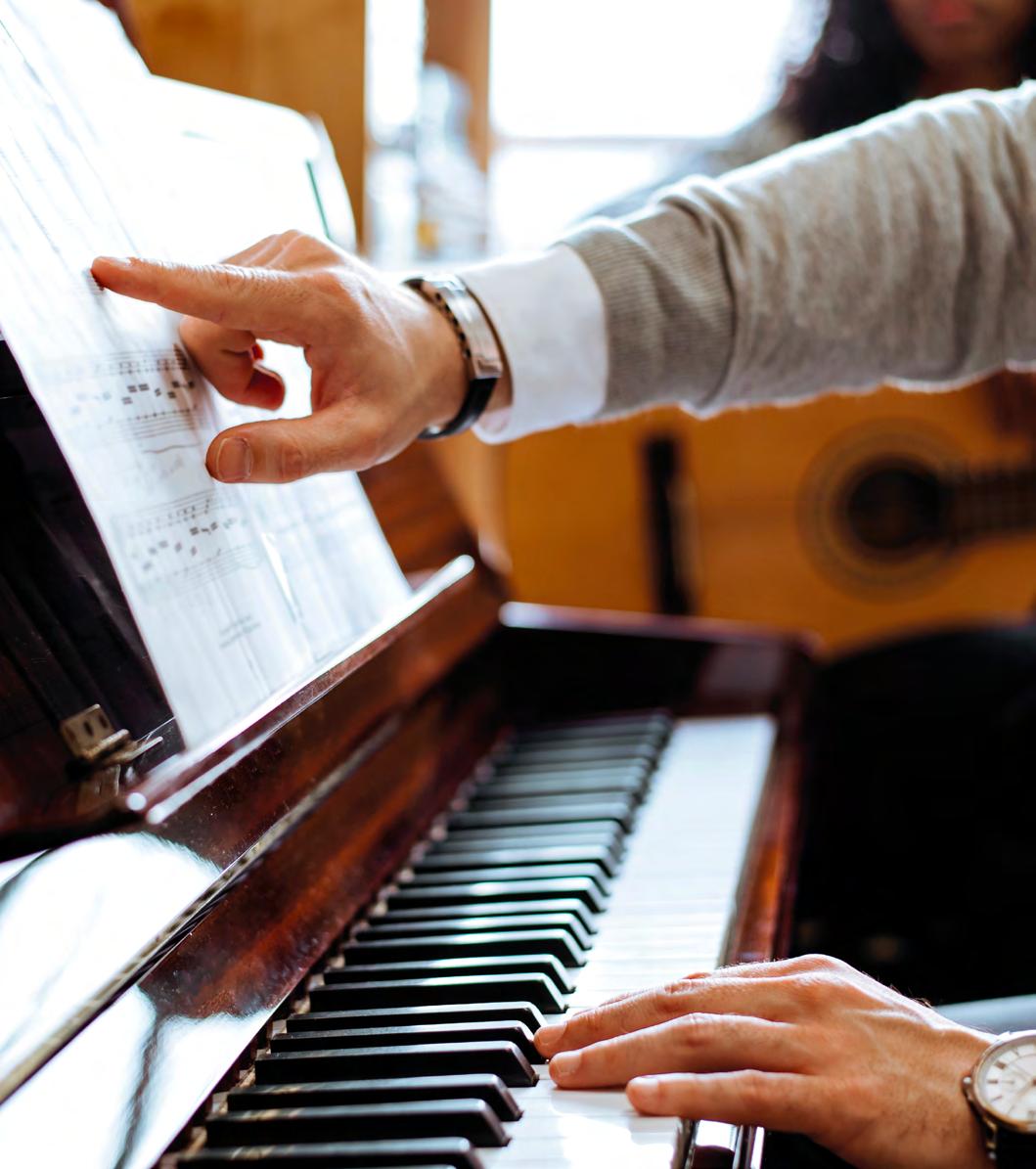








The BTEC National Extended Certificate in Music Performance is a structured and focused qualification that introduces students to key aspects of musical development across performance, theory, and industry practice. Delivered over two years, the course is made up of four units that build technical skills, musical understanding, and professional awareness. Students begin by exploring the foundations of music theory and harmony, before moving into real-world applications through ensemble performance and industry-based projects. The final unit offers a choice between composition or solo performance, allowing learners to tailor the course to their individual strengths and interests. This qualification is equivalent to one A Level and is designed to complement other academic or creative subjects. Assessment is entirely coursework-based, with no written exam, allowing students to demonstrate their abilities through practical tasks and ongoing project work.
Unit 1: Practical Music Theory and Harmony: Learn how music works through scales, chords, and harmonic progressions.
Unit 2: Professional Practice in the Music Industry: Explore how to plan, develop, and deliver a music project in a real-world context.
Unit 3: Ensemble Music Performance: Develop rehearsal techniques and perform as part of a group.
Unit 4: Composing Music or Unit 6: Solo Performance. Choose between developing composition skills or refining solo performance techniques.


Studying Music at BTEC Level 3 offers students a dynamic and practical route into the world of performance, composition, and the music industry. This course is ideal for passionate musicians who want to develop their skills through hands-on learning, live performance opportunities, and real world projects. With a strong focus on creativity, collaboration, and professional practice, students gain valuable experience in rehearsing, performing, and evaluating their work. The qualification is widely recognised by universities and employers, making it a perfect stepping stone for careers in music, media, education, or the creative arts.
COURSE CODE
Pearson BTEC Level 3 National Extended Certificate in Music Performance - 601/7090/6
Students need to be able to play an instrument or sing to a Grade 3 standard. GCSE/Level 2 BTEC music is desirable but not essential

Please note: This course will run subject to sufficient student numbers. Final decisions on course availability will be made based on demand and timetabling feasibility.

Studying BTEC Music opens up exciting career opportunities in the creative industries. Students develop key skills like teamwork, communication, and selfmanagement, alongside musical expertise. Career paths include performing as a solo artist or band member, composing for media or theatre, producing music in studios or live settings, teaching privately or in schools, and working as sound engineers or music therapists. Students may also pursue roles in event management, music journalism, or broadcasting.









Equivalent in size to 1 A Level, this is a well-balanced mix of practical and portfolio elements, centred around the vocational aspects of the performing arts industry suitable for students with a range of previous experience, including those who have not been able to study Performing Arts at school. The course consists of five units of study spread across the two years, developing your practical and written skills to a high standard. Lessons focus primarily on musical theatre skills and many students complete all assessments as an actor, singer and dancer.
You can also choose to be assessed on technical, backstage or design skills in some units. The Performing Arts qualification includes specific pathways for all performing arts specialisms: acting, dance, musical theatre, and theatre production. Each of these pathways has units specifically designed for the specialism and optional units that allow you to specialise even further.
An extensive range of units are available to study, with practical and wider project-based assessments, as well as examined units on:
• Prepare to Work in the Performing Arts Sector
• Influential Performance Practice
• Arts administration
• Original performance


Performing arts offers the opportunity to express your talent and determination as part of a varied, skilled and passionate group of performers. Whether you choose to sing, dance, act or to be part of technical team, the confidence and skills gained through completion of this course are invaluable to any given career path. When comparing surveys of the skills employers want with the subjects offered to sixth form students, the course that best meets the needs of employers is Performing Arts. You will develop confidence, become articulate in front of others and learn how to organise and develop complex projects as part of a team, as well as gaining the high standard of skills required if you wish to pursue a career in a Performing Arts-related field.
COURSE CODE
Cambridge Technicals Level 3 in Performing Arts Extended Certificate - 05851
TYPICAL ENTRY REQUIREMENTS
Grade 4 in GCSE English Language

Please note: This course will run subject to sufficient student numbers. Final decisions on course availability will be made based on demand and timetabling feasibility.

This vocational course equips students with the skills to progress to university or drama school, pursue an apprenticeship, or enter the world of work. While it naturally leads to careers in performing arts, it also opens up opportunities in roles that involve working with people and is a popular choice for students interested in studying law, English, and other arts-related subjects.









A wide range of centre assessed units with practical and wider project-based assessment opportunities, as well as examined units on the body systems and the effects of physical activity; how sport is organised and the purpose of sports development.
Learners will take five units made up of mandatory and optional units. All students will study the following units:
• Body systems and the effects of physical activity
• Sports coaching and activity leadership
• Sports organisation and development
• Sports injury and rehabilitation
• Organisation of sports events
These units will give learners an understanding of sport in the wider contexts of coaching and leadership, anatomy and physiology, the body’s short- and long-term responses to physical activity and the framework of sport in the UK and the organisations involved. Learners will also develop transferable skills such as planning, communication, adaptability and leadership.


The course has been designed, in collaboration with experts spanning the breadth of the leisure and fitness sector, using refreshing and exciting content, that’s up to date, engaging, fit for purpose and suitable for the needs of students. The qualification will develop your knowledge, understanding and skills of the principles of sport and physical activity. This qualification is for learners 16 years old or over who want to study sport, leisure or fitness. This qualification is not just about being able to play sport, it will provide learners with the skills, knowledge and understanding to progress into Higher Education on a sport-related programme.
COURSE CODE
Cambridge Technical Level 3
Extended Certificate in Sport and Physical Activity - 05827
TYPICAL ENTRY REQUIREMENTS
Grade 4 in GCSE English Language Grade 4 in GCSE Science

Please note: This course will run subject to sufficient student numbers. Final decisions on course availability will be made based on demand and timetabling feasibility.

Students practically apply their skills and knowledge in preparation for further study or the workplace. Future careers include coaching, nutritionist, personal trainer, fitness instructor, leisure centre manager, sports therapy, PE teacher, primary teacher, sports development officer, sport psychologist, fitness centre manager, outdoor pursuits’ centre manager, health trainer, sport science, physiologist, physiotherapy, armed forces, sports journalism, events management, sports marketing and many more.









This two-year course is equivalent to one A Level and provides a broad introduction to the travel and tourism industry. It is designed for post-16 learners who wish to continue their education through applied learning. The programme includes three mandatory units and one optional unit, covering topics such as the structure of the travel and tourism industry, global destinations, and principles of marketing.
The three mandatory units cover the following content areas.
• The travel and tourism industry – the travel and tourism industry in the UK is growing and is of major importance to the economy. Learners will develop the skills needed to examine, interpret and analyse a variety of statistics that measure the importance of tourism to the UK.
• Different types of destinations and their importance – learners will investigate the features and appeal of global destinations.
• Principles of marketing in travel and tourism – learners will explore how to develop a successful marketing plan for use by travel and tourism organisations to attract and engage with customers using research data.
Assessment is through a combination of externally set exams and internally assessed coursework.


Travel and tourism is one of the fastest-growing sectors in the UK and globally. This course offers learners the opportunity to explore the dynamic nature of the industry, understand its economic importance, and develop transferable skills such as communication, research, and customer service. It is ideal for students who enjoy learning through practical tasks and real-world scenarios. The qualification supports progression to higher education and careers in travel, tourism, hospitality, and business.
COURSE CODE
Pearson BTEC Level 3 National Extended Certificate in Travel and Tourism - 601/9023/1
TYPICAL ENTRY REQUIREMENTS
Grade 4 in GCSE English Language
CAREER POSSIBILITIES
This qualification opens doors to a wide range of career paths, including:

Please note: This course will run subject to sufficient student numbers. Final decisions on course availability will be made based on demand and timetabling feasibility.

• Travel agency and tour operations
Airline and airport services
Hospitality and hotel management
• Event planning and visitor attractions
• Tourism marketing and destination management
It also provides a strong foundation for further study at university in subjects such as tourism management, international business, or hospitality.









The BTEC National in Uniformed Protective Service is designed to equip learners with the knowledge, understanding and skills required for success when moving towards a career in the uniformed services, for example, Police, Emergency Fire Services, Prison Service, Security or Armed Services. Its main purpose is to allow learners to develop the core specialist knowledge, understanding and skills, including government policies and leadership and teamwork required by the sector.
Units delivered are:
• Behaviour and Discipline in the Uniformed Protective Services – examined unit
• Teamwork, Leadership and Communication in the Uniformed Protective Services
• Introduction to Criminology
• Police Powers and the Law
The course is studied over two years. It is portfolio-based with various assessment methods: practical, written and verbal. There is an examined unit – Behaviour and Discipline in the Uniformed Protective Services which consists of a 2 & 1/2 hour examination.
This qualification will:


Enable students to progress to university to study a variety of degrees including Public Services, Politics, Criminal Justice, Psychology, Exercise and Fitness. Alternatively, students can progress to employment in the Uniformed Services. During the course, you will gain a range of knowledge and skills from the theoretical and practical study. You will develop key team working, leadership and problem-solving skills and will be continually assessed over the two years through various assessment methods.
COURSE CODE
Pearson BTEC Level 3 Extended Certificate - 603/5067/2
TYPICAL ENTRY REQUIREMENTS
Grade 4 in GCSE English Language
CAREER POSSIBILITIES

Please note: This course will run subject to sufficient student numbers. Final decisions on course availability will be made based on demand and timetabling feasibility.

Public Services, provided by government such as Law Enforcement, Health, Defence and Central and Local Government remain in demand and, whilst growth has slowed, will continue to have a vital role in the economic and social welfare of the nation. By studying a BTEC National Award Course, learners develop knowledge, understanding and skills required by the sector, including essential employability skills and apply them in real work contexts.
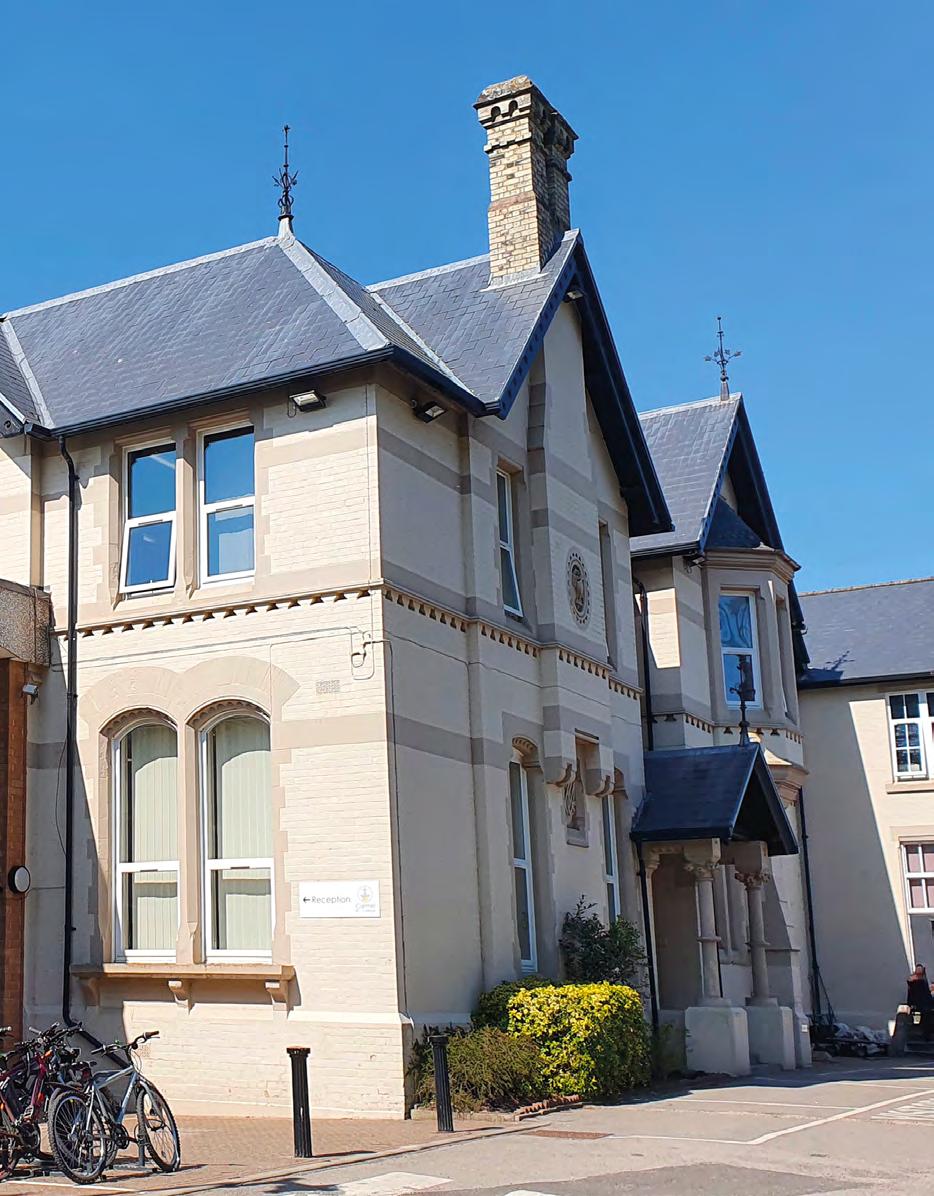





Carmel is located in the west end of Darlington.
We are approximately a 5-10 minute drive from Darlington Train Station, which is on the East Coast Main line.











